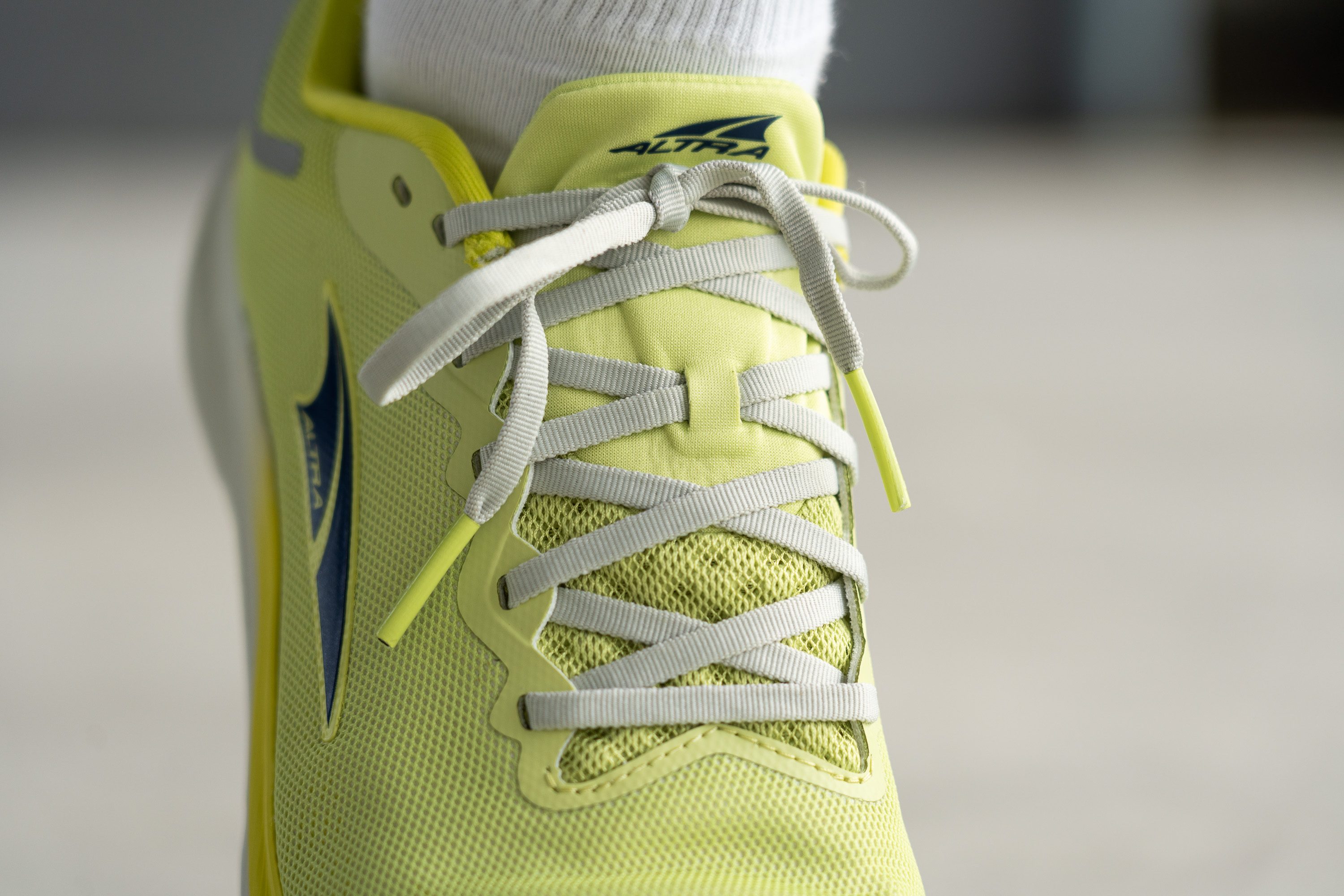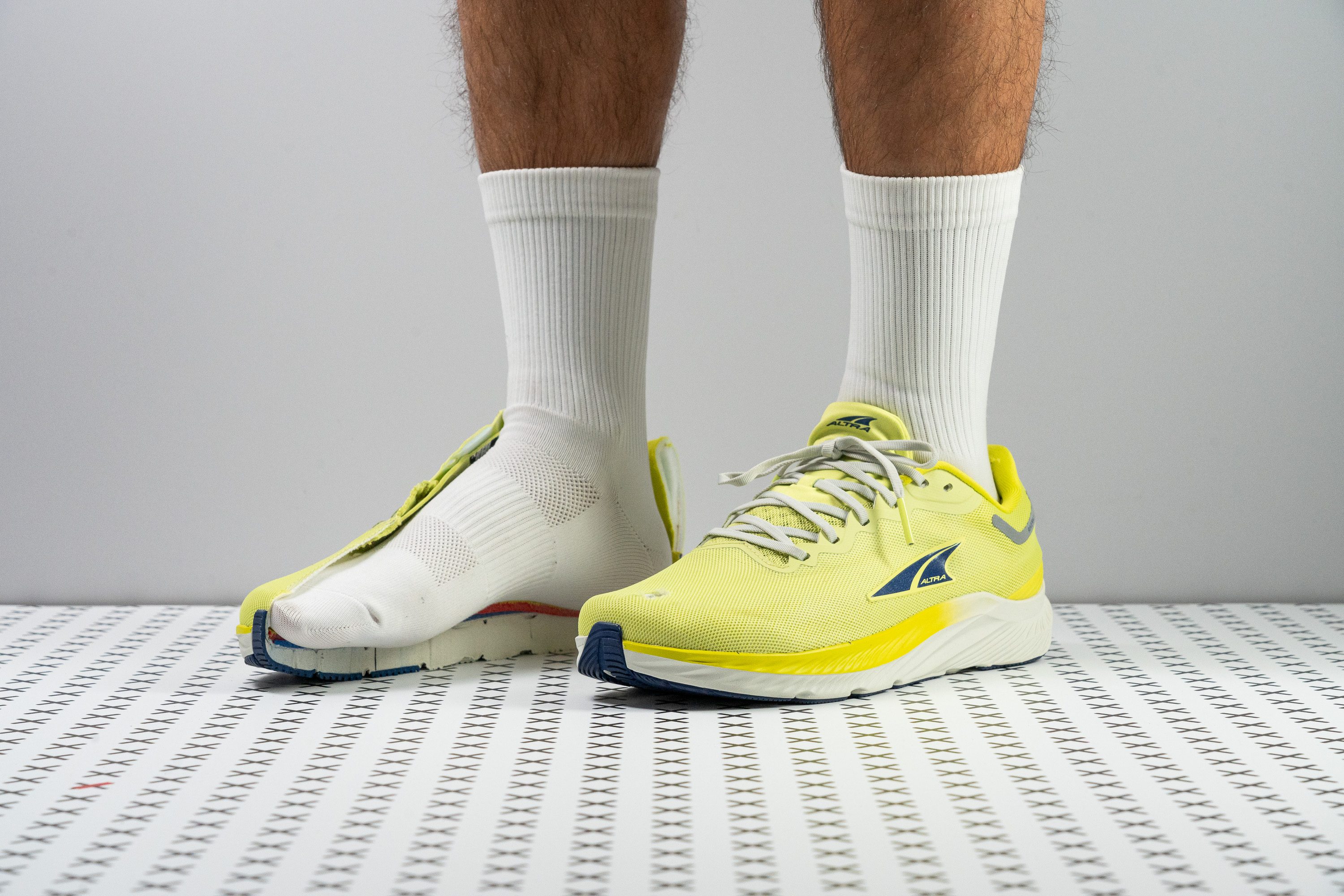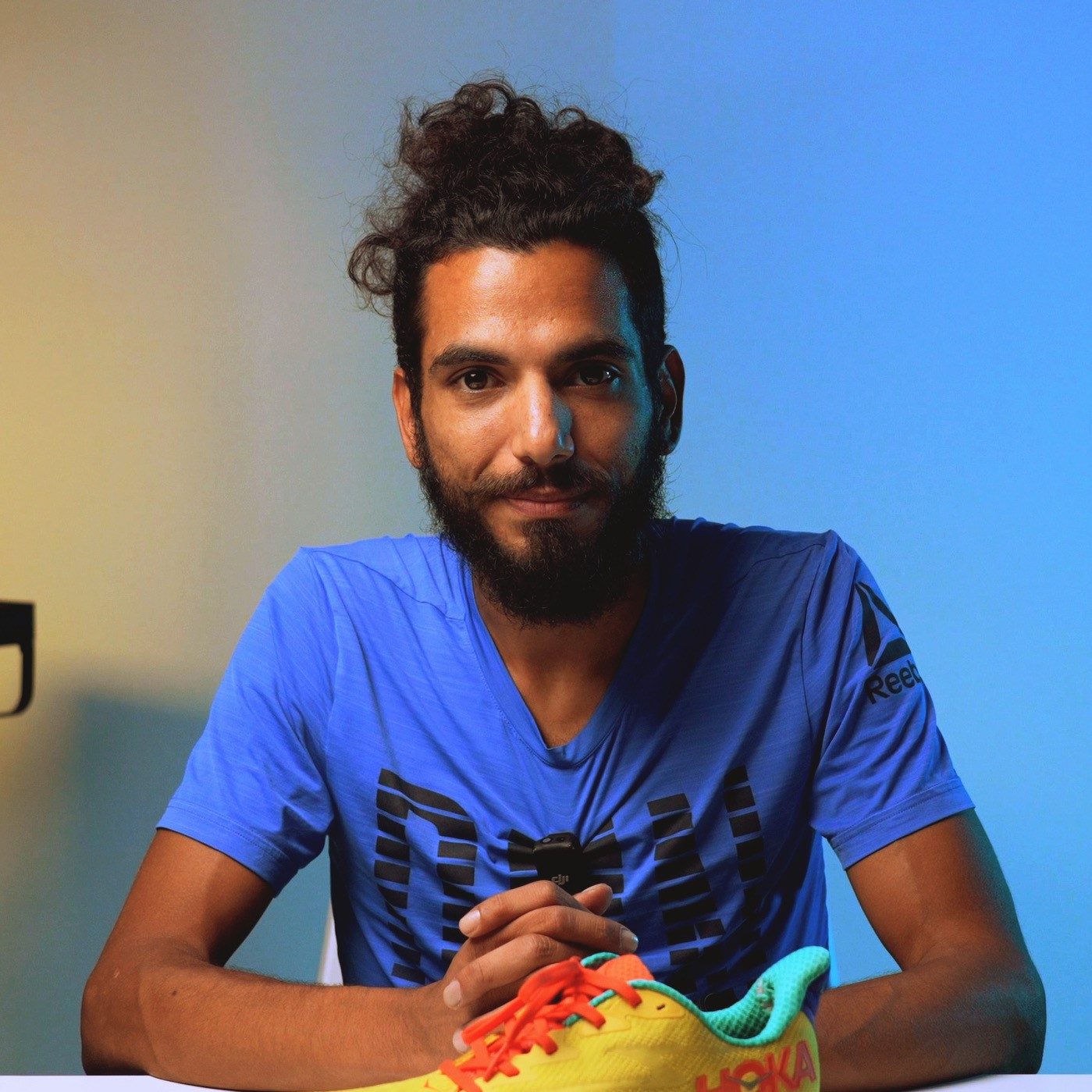Our verdict
- Top pick in best running shoes with a wide toebox (2024)
- Top pick in best zero drop running shoes (2023)
Pros
- Great for easy runs
- Superb comfort
- Plush cushioning
- Peppy and responsive
- Flexible and forgiving ride
- Unhindered and smooth strides
- Toebox easily accommodates wide feet
- Works great as a walking shoe
- Can go sockless
Cons
- Lockdown needs a lace lock
- Laces get untied easily
- Not great for speedwork
Audience verdict
- Top 26% in Altra running shoes
Comparison
The most similar running shoes compared
+ + Add a shoe | |||||
|---|---|---|---|---|---|
| Audience score | 88 Great! | 84 Good! | 85 Good! | 83 Good! | |
| Price | $140 | $135 | $130 | $130 | |
| Pace | Daily running | Daily runningTempo | Daily runningTempo | Daily running | |
| Shock absorption | - | Moderate | - | Low | |
| Energy return | - | Low | - | Moderate | |
| Traction | - | High | - | High | |
| Arch support | Neutral | Neutral | Neutral | Neutral | |
| Weight lab Weight brand | 9.1 oz / 257g 9.8 oz / 278g | 7.7 oz / 217g 7.6 oz / 215g | 8.3 oz / 235g 10 oz / 283g | 8.4 oz / 237g 9.5 oz / 269g | |
| Lightweight | ✗ | ✓ | ✓ | ✓ | |
| Drop lab Drop brand | 1.7 mm 0.0 mm | 5.9 mm 5.0 mm | 0.4 mm 0.0 mm | 1.4 mm 0.0 mm | |
| Strike pattern | Mid/forefoot | Mid/forefoot | Mid/forefoot | Mid/forefoot | |
| Size | Slightly small | Half size small | Slightly small | True to size | |
| Midsole softness | Soft | Soft | Soft | Balanced | |
| Difference in midsole softness in cold | Normal | Small | Normal | Normal | |
| Toebox durability | Bad | Bad | Decent | Good | |
| Heel padding durability | Good | Good | Bad | Good | |
| Outsole durability | Good | Decent | Good | Good | |
| Breathability | Moderate | Breathable | Moderate | Moderate | |
| Width / fit | Medium | Wide | Narrow | Wide | |
| Toebox width | Wide | Wide | Wide | Wide | |
| Stiffness | Stiff | Moderate | Stiff | Flexible | |
| Torsional rigidity | Moderate | Stiff | Flexible | Flexible | |
| Heel counter stiffness | Moderate | Moderate | Flexible | Flexible | |
| Heel lab Heel brand | 28.4 mm 28.0 mm | 32.8 mm 34.5 mm | 28.4 mm 28.0 mm | 23.8 mm 24.0 mm | |
| Forefoot lab Forefoot brand | 26.7 mm 28.0 mm | 26.9 mm 29.5 mm | 28.0 mm 28.0 mm | 22.4 mm 24.0 mm | |
| Widths available | Normal | Normal | Normal | Normal | |
| Orthotic friendly | ✓ | ✓ | ✓ | ✓ | |
| Season | All seasons | SummerAll seasons | All seasons | All seasons | |
| Removable insole | ✓ | ✓ | ✓ | ✓ | |
| Ranking | #288 Top 43% | #252 Bottom 34% | #216 Bottom 43% | #268 Bottom 30% | |
| Popularity | #551 Bottom 19% | #134 Top 35% | #296 Bottom 22% | #93 Top 25% |
Who should buy
We recommend the Altra Rivera 3 as an excellent option for:
- Those looking for a comfy and well-cushioned introduction to the world of zero-drop running shoes.
- Runners in the market for a shoe that boasts a flexible and natural ride that's forgiving on the foot.
- Zero-drop enthusiasts who want a good amount of plush foam underfoot for daily runs
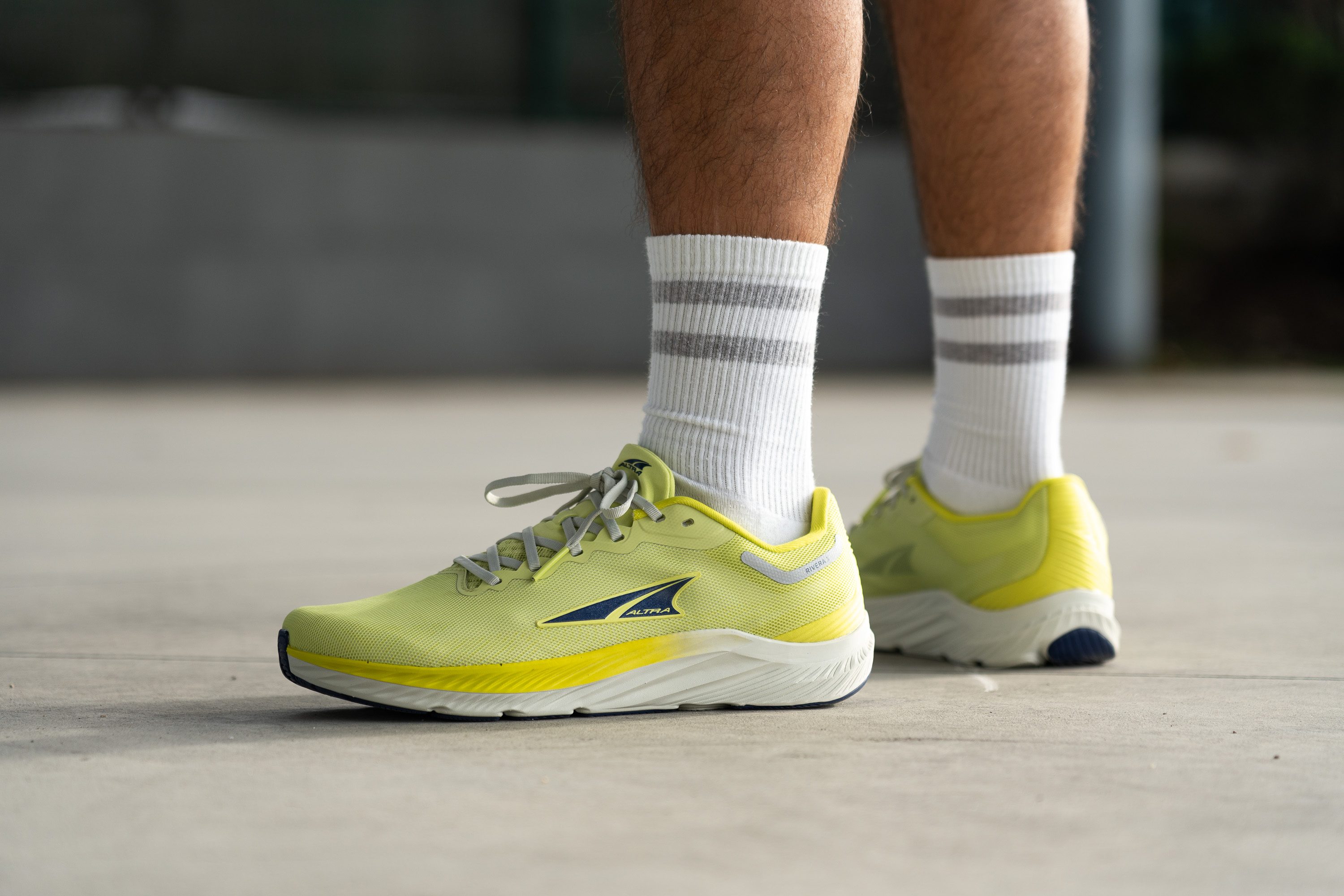
Who should NOT buy
The Rivera 3's heel counter is very comfortable but doesn't provide adequate rearfoot lockdown which becomes a little prohibitive when trying to push the pace. While this can be mitigated by lace-locking the shoe, we also recommend the Altra Escalante 3 as a speedy alternative with a much more secure lockdown.
We found a slight discrepancy with the stated forefoot stack height which leaves the Rivera 3 with a drop height of 1.7 mm. Zero-drop purists will be much happier with the Altra Torin 7 which actually has a negative heel drop of -0.8 mm.
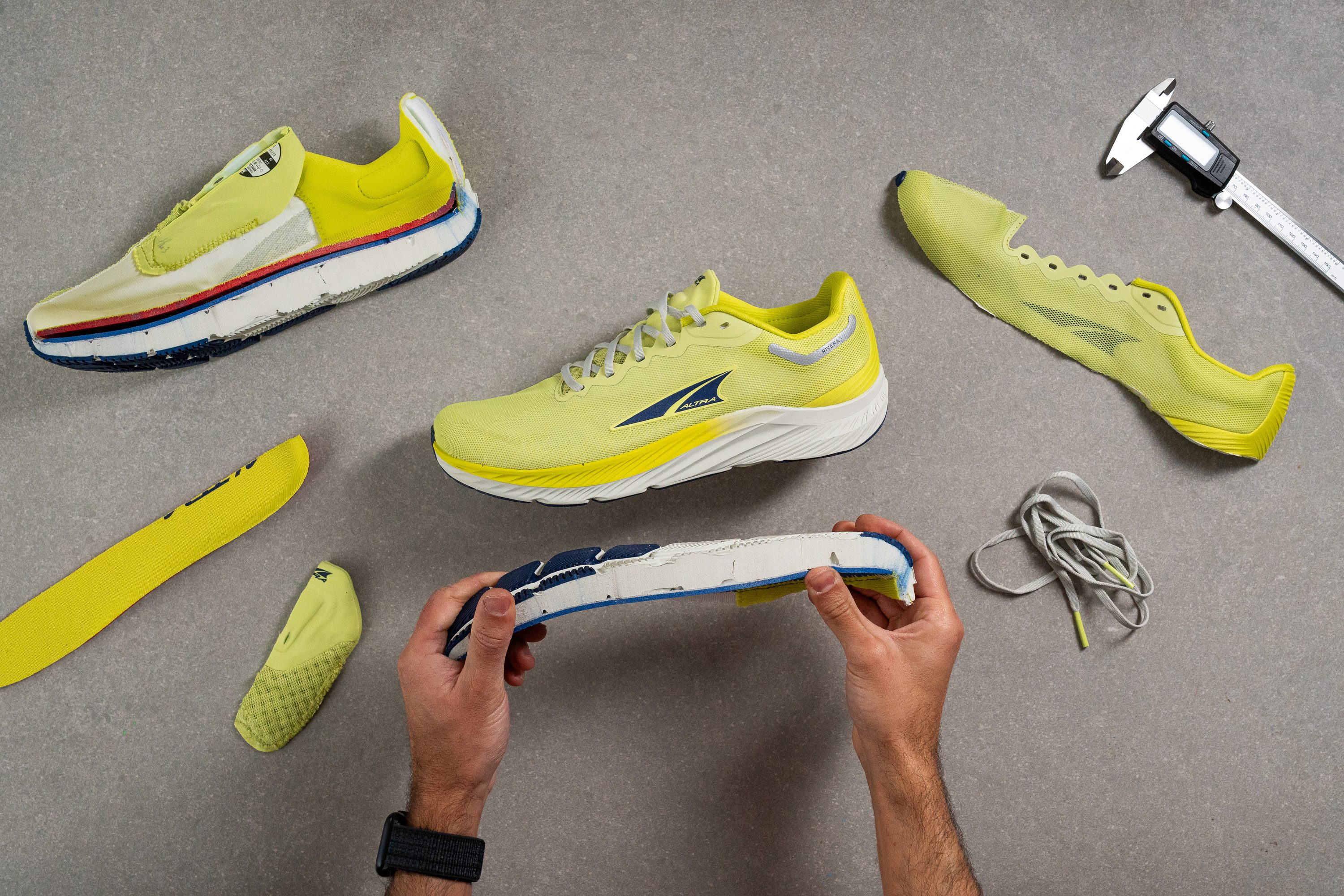
Heel-striking runners might find the Rivera 3's midsole a little too narrow at the heel for confident and stable landings. We suggest looking into the Altra VIA Olympus as an alternative with a broader rearfoot platform.
Cushioning
Heel stack
Using our caliper, we measured the Rivera 3's stack to be 28.4 mm thick at the heel.
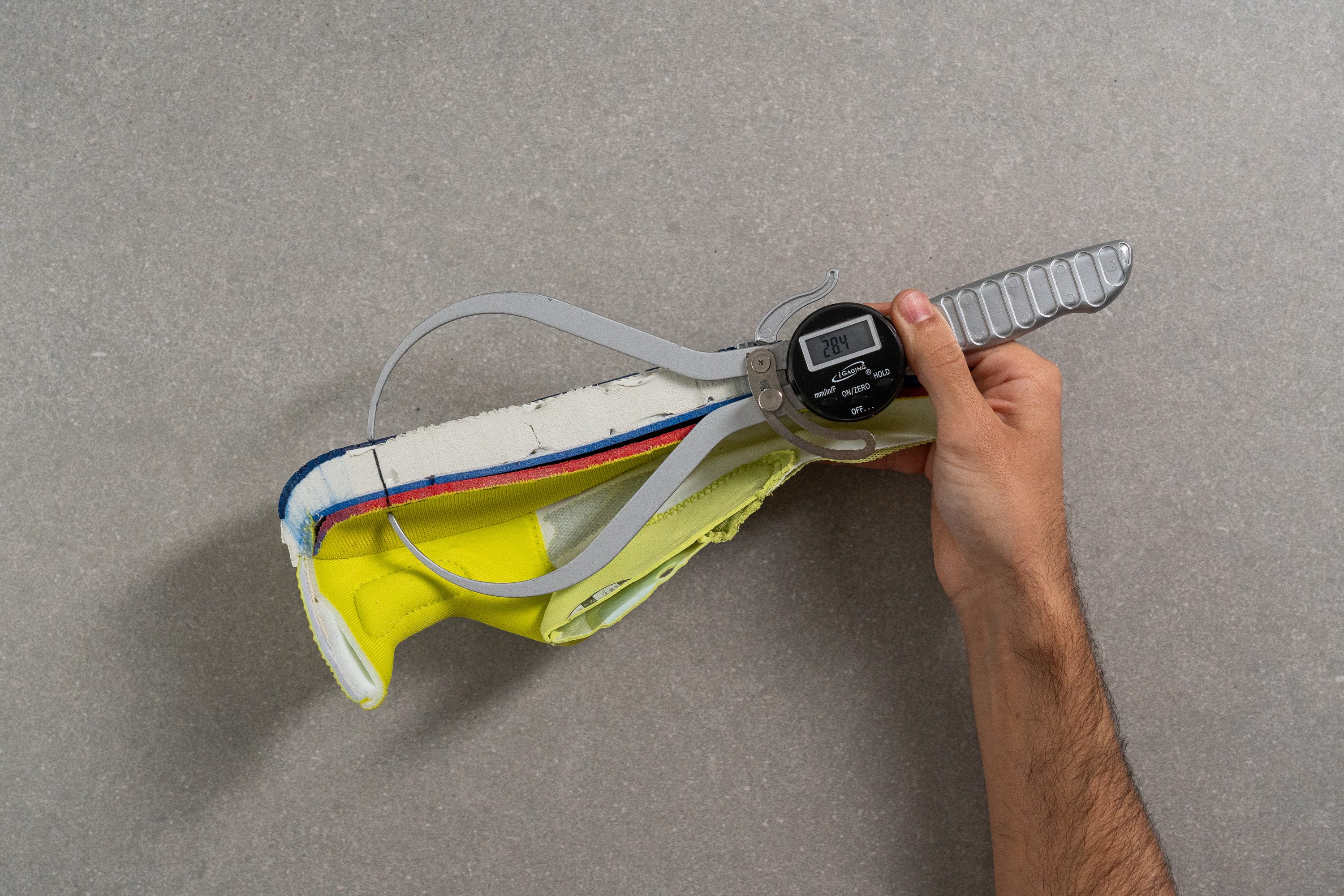
This is slightly shorter than average but still provides us with ample foam underfoot to savor the shoe's cushioning and feel protected during our test runs.
| Rivera 3 | 28.4 mm |
| Average | 34.8 mm |
Forefoot stack
As a zero-drop shoe, we expect the forefoot stack measurement to match the heel stack but with the Rivera 3, we found a slight anomaly. The shoe's forefoot stack is slightly shorter than spec at 26.7 mm according to our caliper measurements.
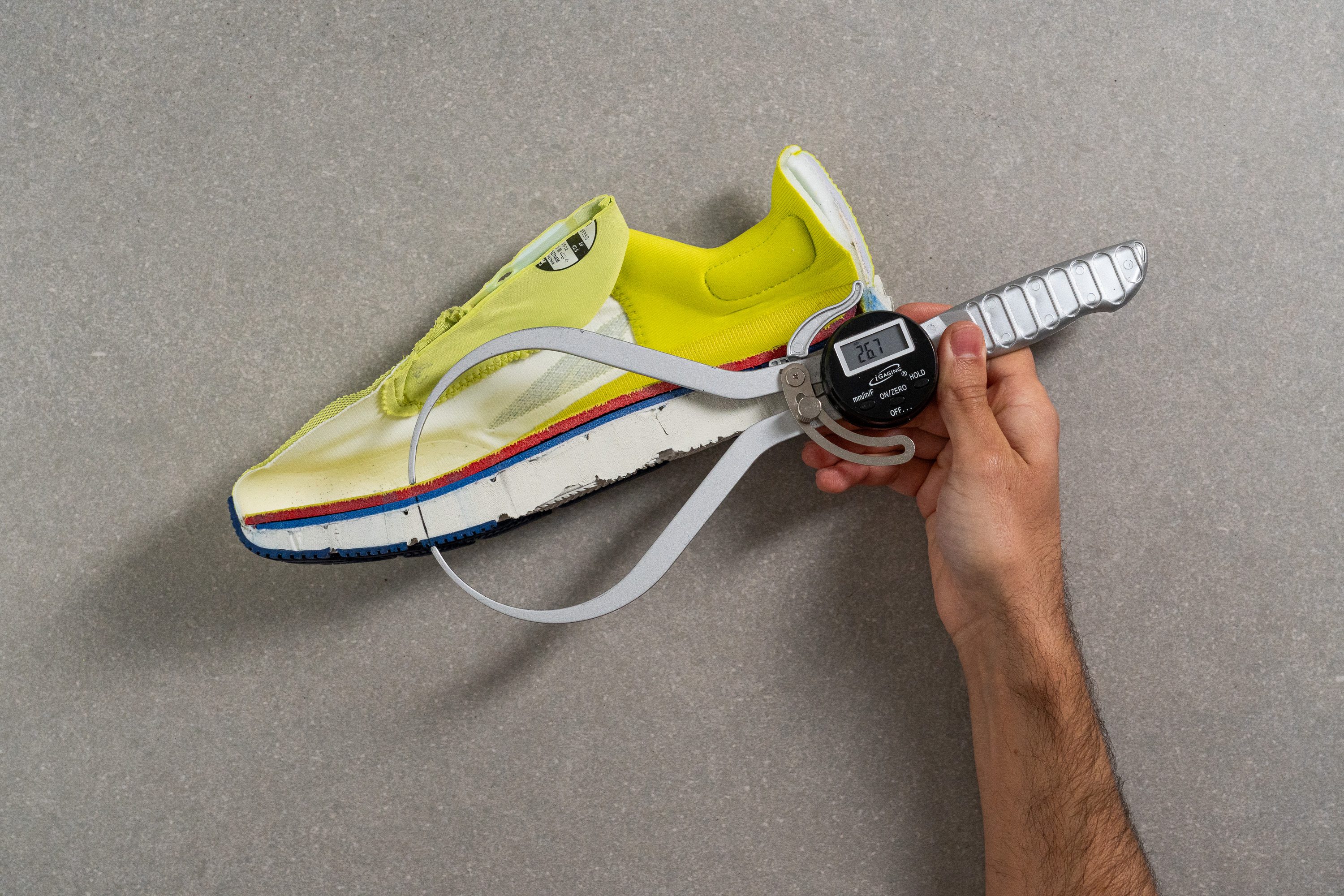
We measure the stack using World Athletics guidelines which may differ from Altra's measuring standard and could account for this minor discrepency.
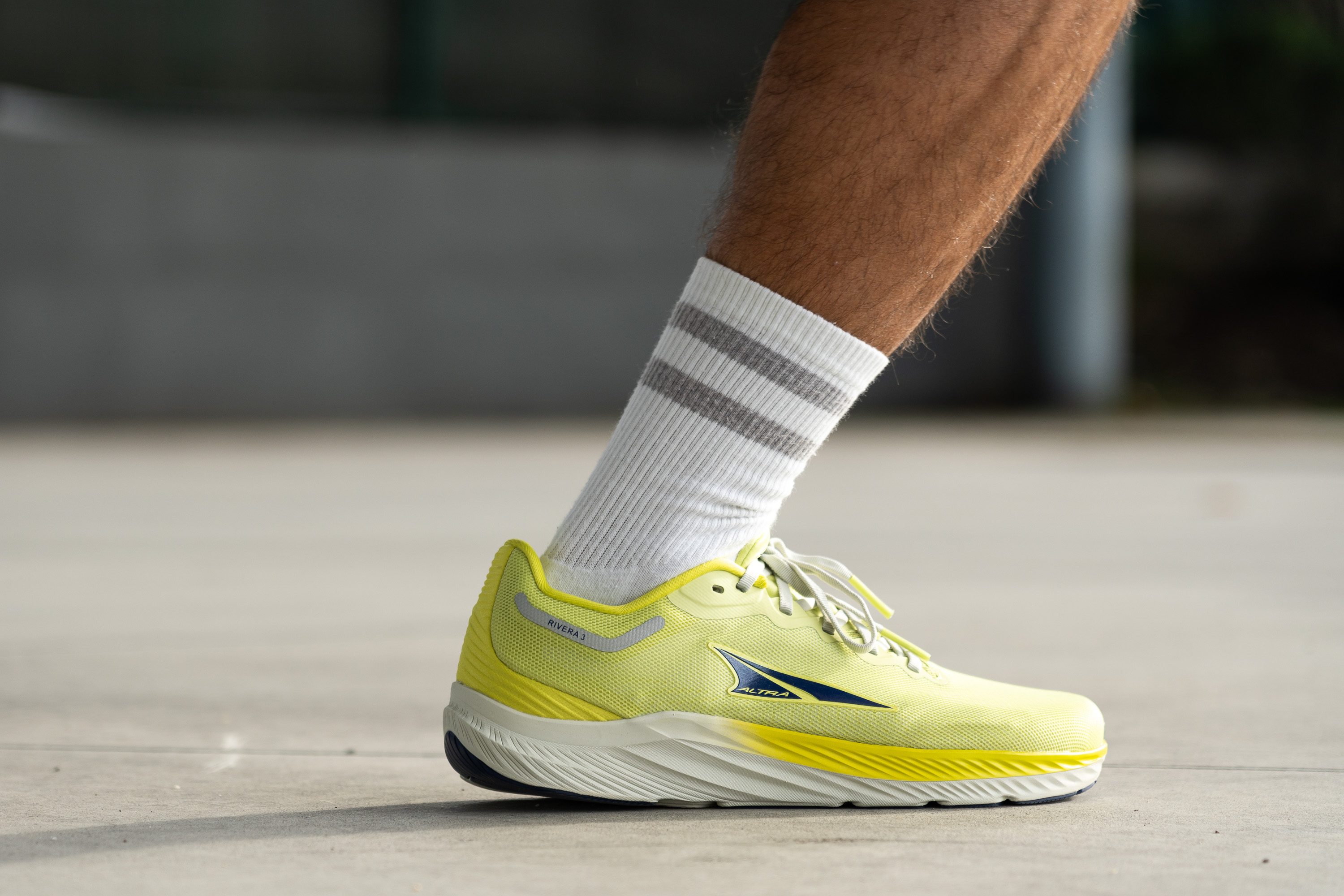
As it stands, this is slightly higher than our current lab average and means that the shoe effectively muted the impact from the harsh asphalt below as we tested the shoe. alternatively. runners who prefer a more grounded ride from their zero-drop trainers should look into the Altra Escalante 3 or the previous edition of this model, the Rivera 2.
| Rivera 3 | 26.7 mm |
| Average | 26.2 mm |
Drop
The difference in our stack measurements leaves us with an offset of 1.7 mm. If we're being technical, this puts the Rivera 3 in the category of low-drop shoes, however, for all intents and purposes, it does feel and ride like a zero-drop shoe out on the road.
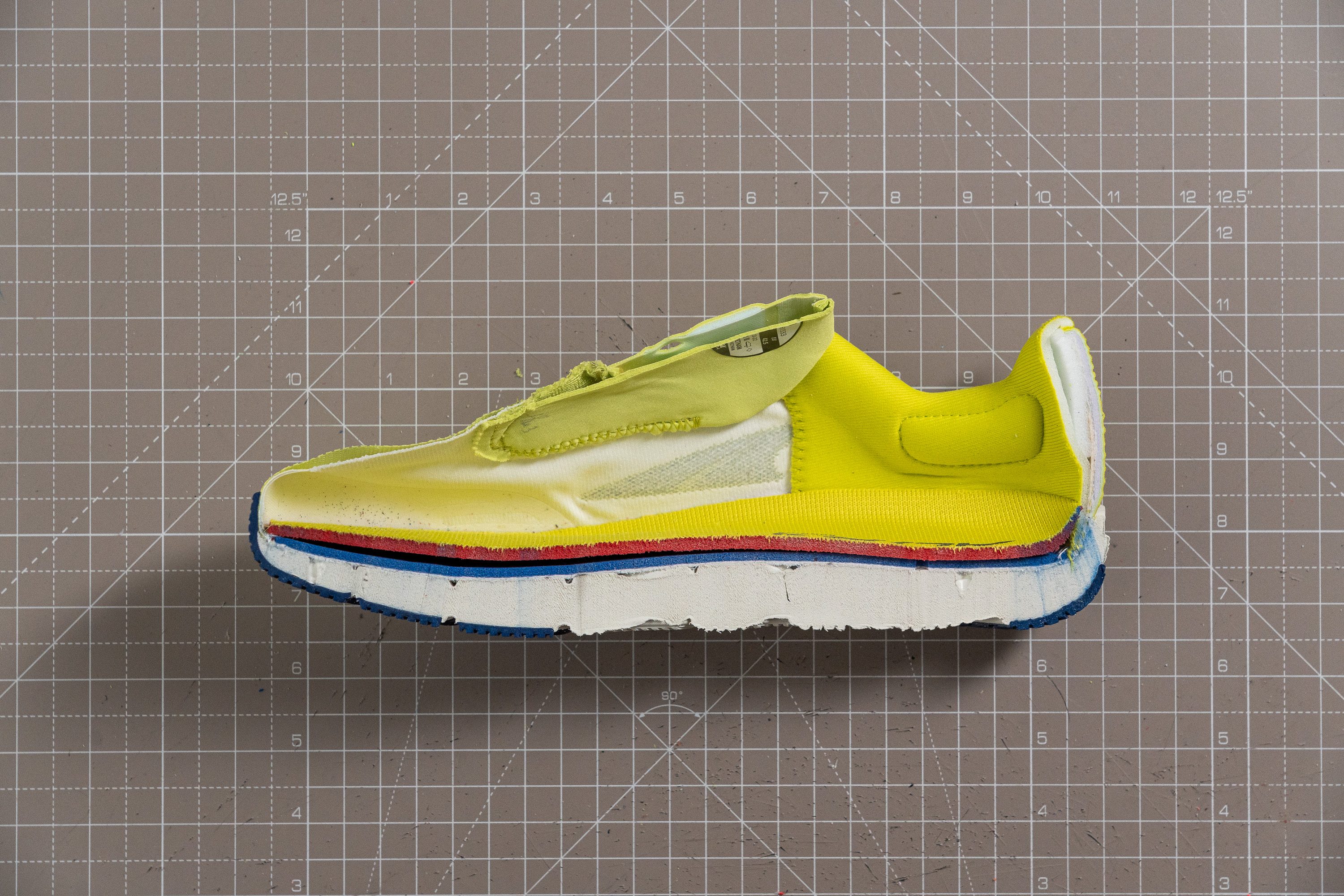
Heel-striking runners more used to running with an elevated heel should consider easing their way down to a zero-drop shoe with something like the Saucony Kinvara 14 which boasts a 4 mm heel drop.
For a comprehensive look at the pros and cons of different drop heights, check out this handy guide that delves into the matter.
| Rivera 3 | 1.7 mm |
| Average | 8.6 mm |
Midsole softness
Pressing our durometer against the Rivera 3's midsole gives us an incredibly plush reading of 15.4 HA.
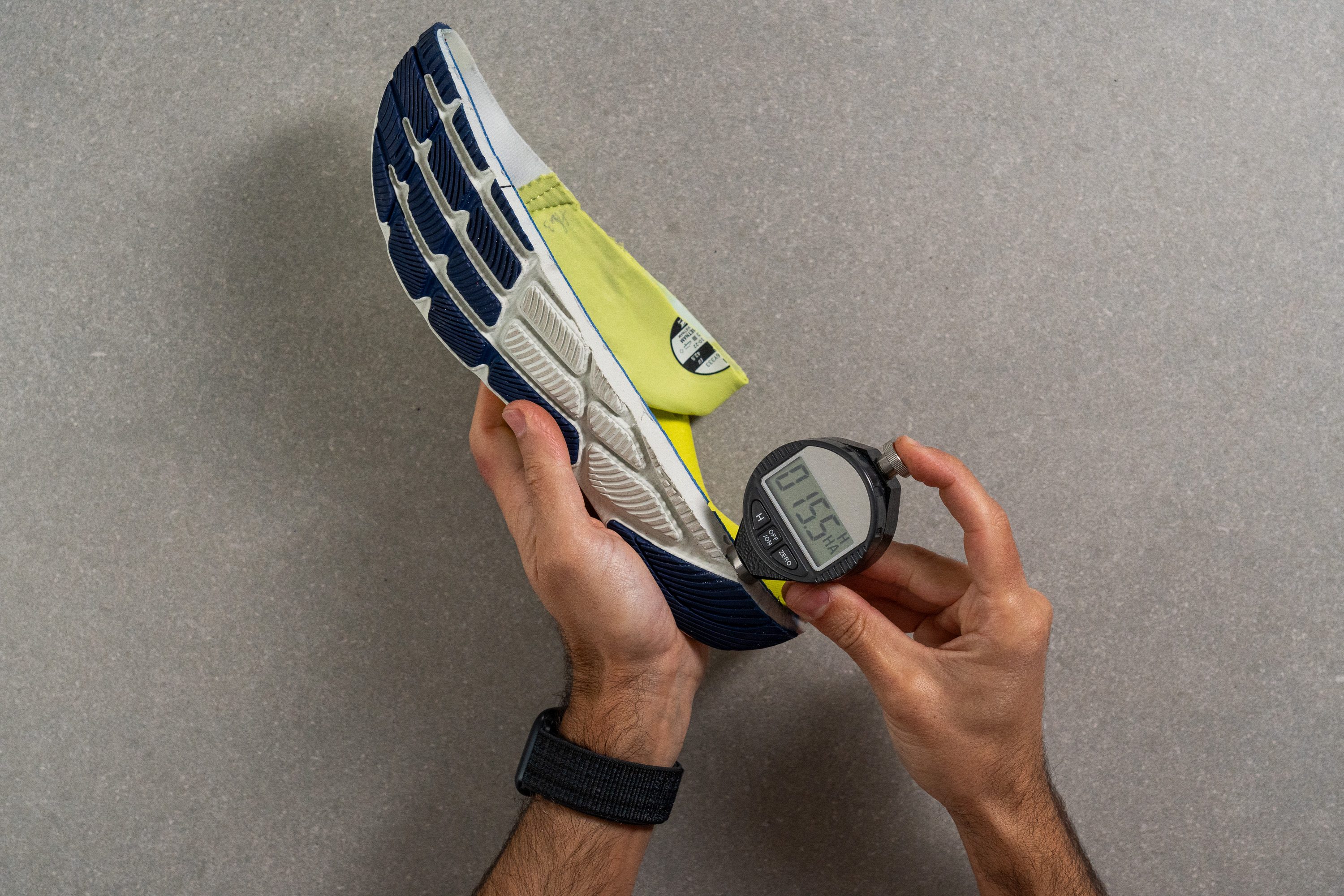
This level of softness gives our landings a pleasant, pillowy sensation that effectively dampens the impact of our landings followed by a snappy rebound that has a nice bounce to it and brings some fun to our daily runs.
| Rivera 3 | 15.4 HA |
| Average | 20.4 HA |
Size and fit
Size
Altra Rivera 3 fits slightly small (25 votes).
Internal length
| Rivera 3 | 272.0 mm |
| Average | 269.4 mm |
Width / Fit
The Rivera 3's toebox is more spacious than the average road shoe, measuring 100.5 mm wide at its widest points. This gives us a nice amount of wiggle room in the toebox that keeps our feet from feeling oppressed while running in this shoe. It also makes the Rivera 3 a good choice for runners with broad feet.
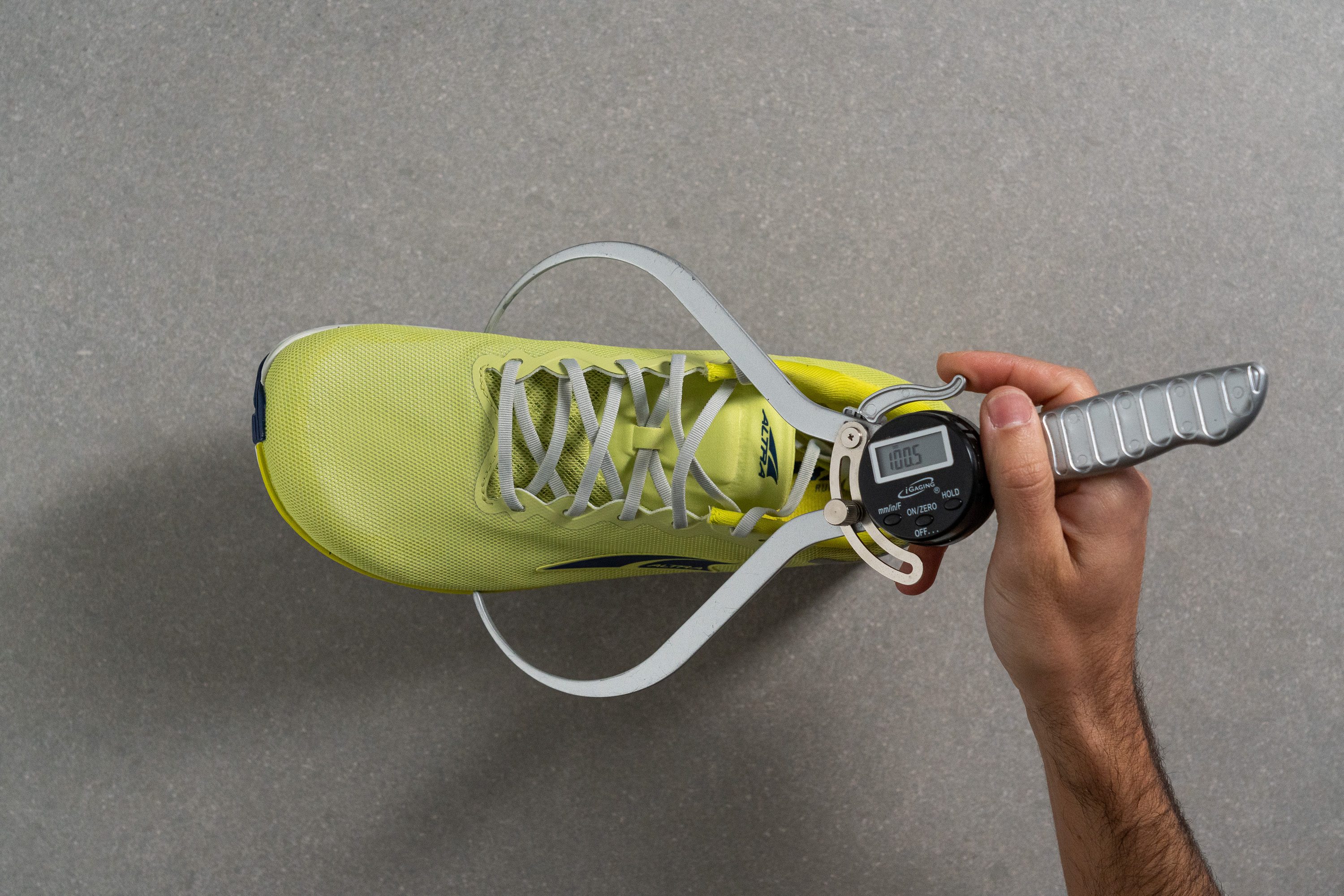
Those with narrow feet, on the other hand, should look into the Slim Fit version of this model for a more snug lockdown or its less roomy cousin, the Altra VIA Olympus.
This test follows an older methodology, which is why you don't see recently tested shoes in the chart. Results from different methodologies can not be compared.
| Rivera 3 | 100.5 mm |
| Average | 98.5 mm |
Toebox width
One of the main hallmarks of Altra running shoes exemplified by the Rivera 3 is its natural, foot-shaped silhouette that doesn't taper as much as the average trainer.
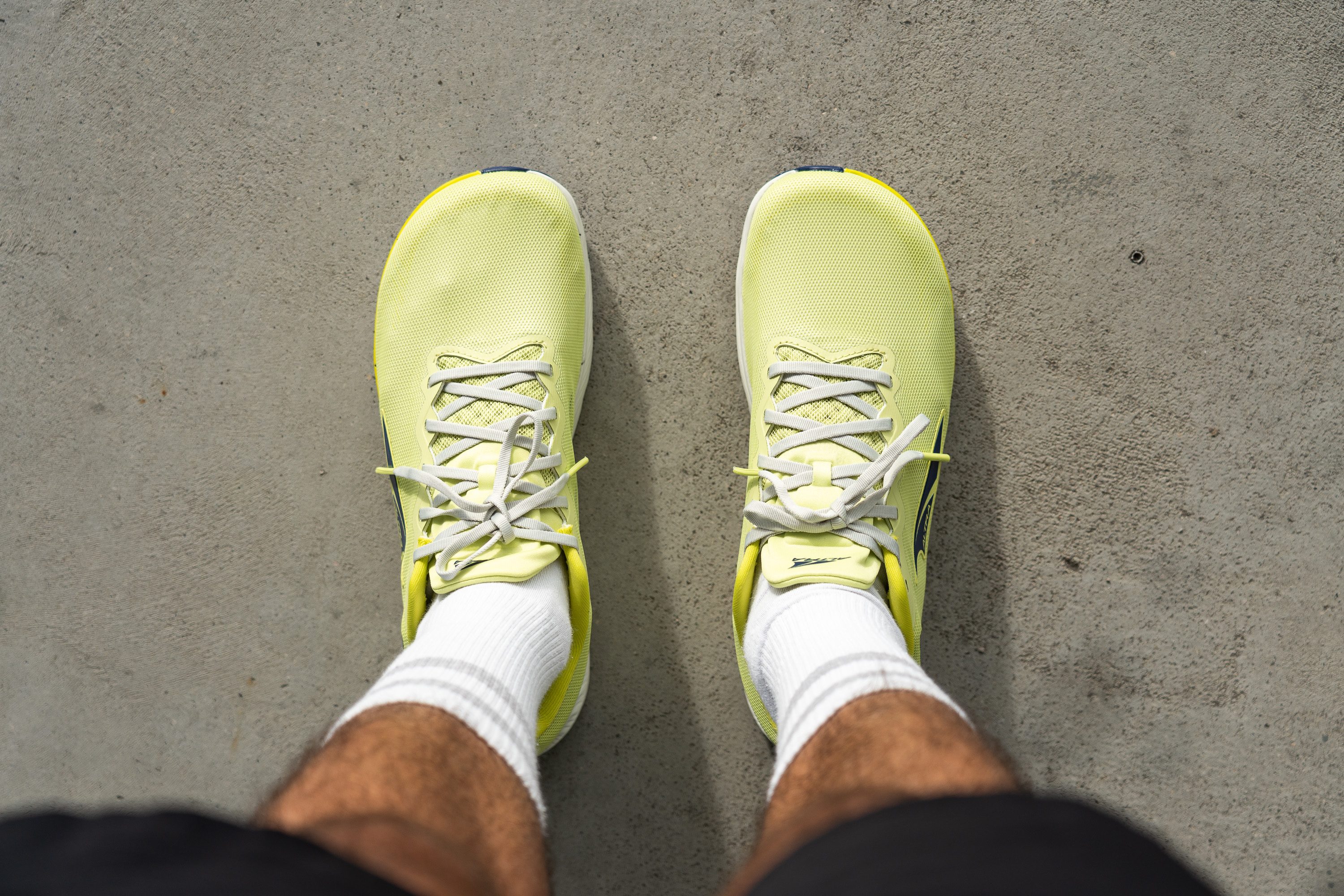
At 87.7 mm wide in the area around the big toe, the Rivera 3 is significantly wider than our current lab average. This gives us plenty of room to splay out comfortably without feeling constricted by the shoe's upper.
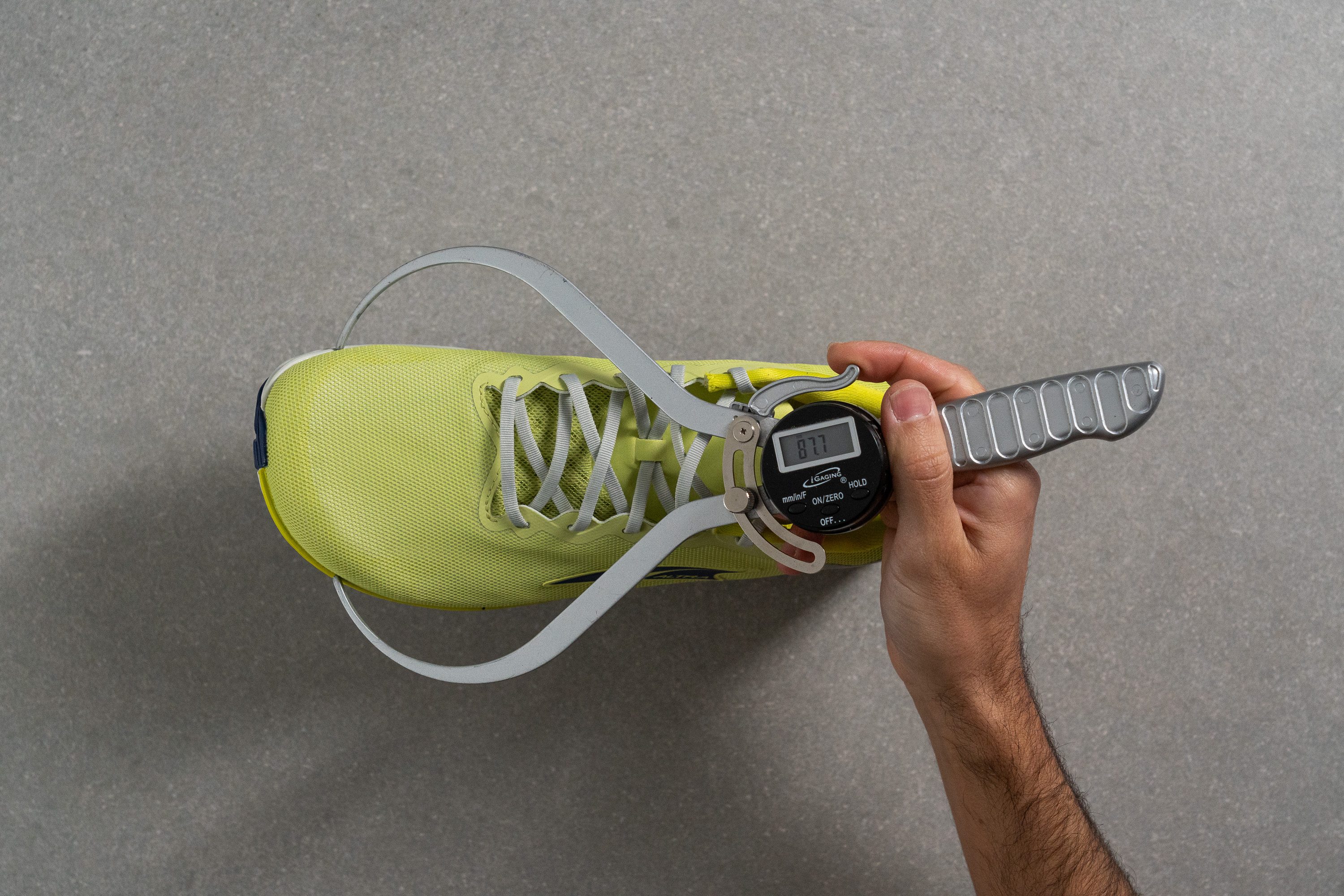
This test follows an older methodology, which is why you don't see recently tested shoes in the chart. Results from different methodologies can not be compared.
| Rivera 3 | 87.7 mm |
| Average | 78.4 mm |
Flexibility / Stiffness
We secured the Rivera 3 to our workbench and found that 23.1N of force is needed to bend the shoe to 90 degrees. This makes the Rivera 3 more flexible than the average road shoe
This allows the Rivera 3 to bend along with our foot with relative ease which is ideal for a daily trainer as it gives the shoe a responsive yet forgiving ride that's suitable for a variety of runs; from recovery days to long slow distances and even some speedwork.
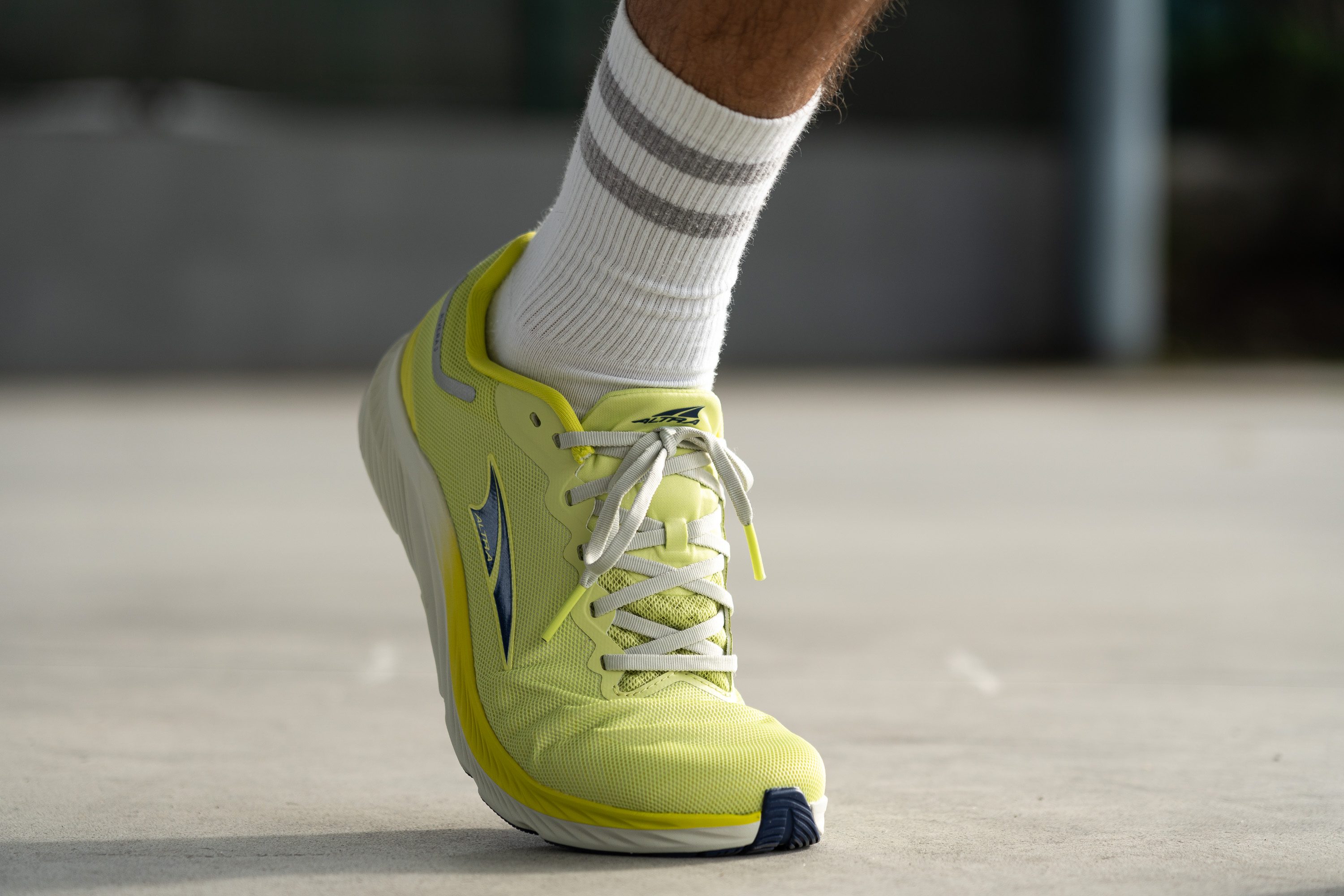
This test follows an older methodology, which is why you don't see recently tested shoes in the chart. Results from different methodologies can not be compared.
| Rivera 3 | 23.1N |
| Average | 28.1N |
Stiffness in cold (%)
We also repeated the stiffness test after leaving the Rivera 3 in the freezer for twenty minutes and found that it only became 22.3% stiffer. With 28.3N of force now needed to bend the shoe to the desired point, the chilled Rivera 3 is more flexible than the average road shoe at room temperature, let alone under similar conditions. As such, the Rivera 3's flexibility should feel pretty consistent even as the mercury drops during the winter months.
| Rivera 3 | 22% |
| Average | 33% |
Weight
Which brings us to the weigh-in and the Rivera 3 tips the scale at a very average weight of 9.1 oz (257g). This is a pretty good weight for a daily trainer as it still feels light enough on the foot to facilitate longer or speedier efforts without feeling like a burden.
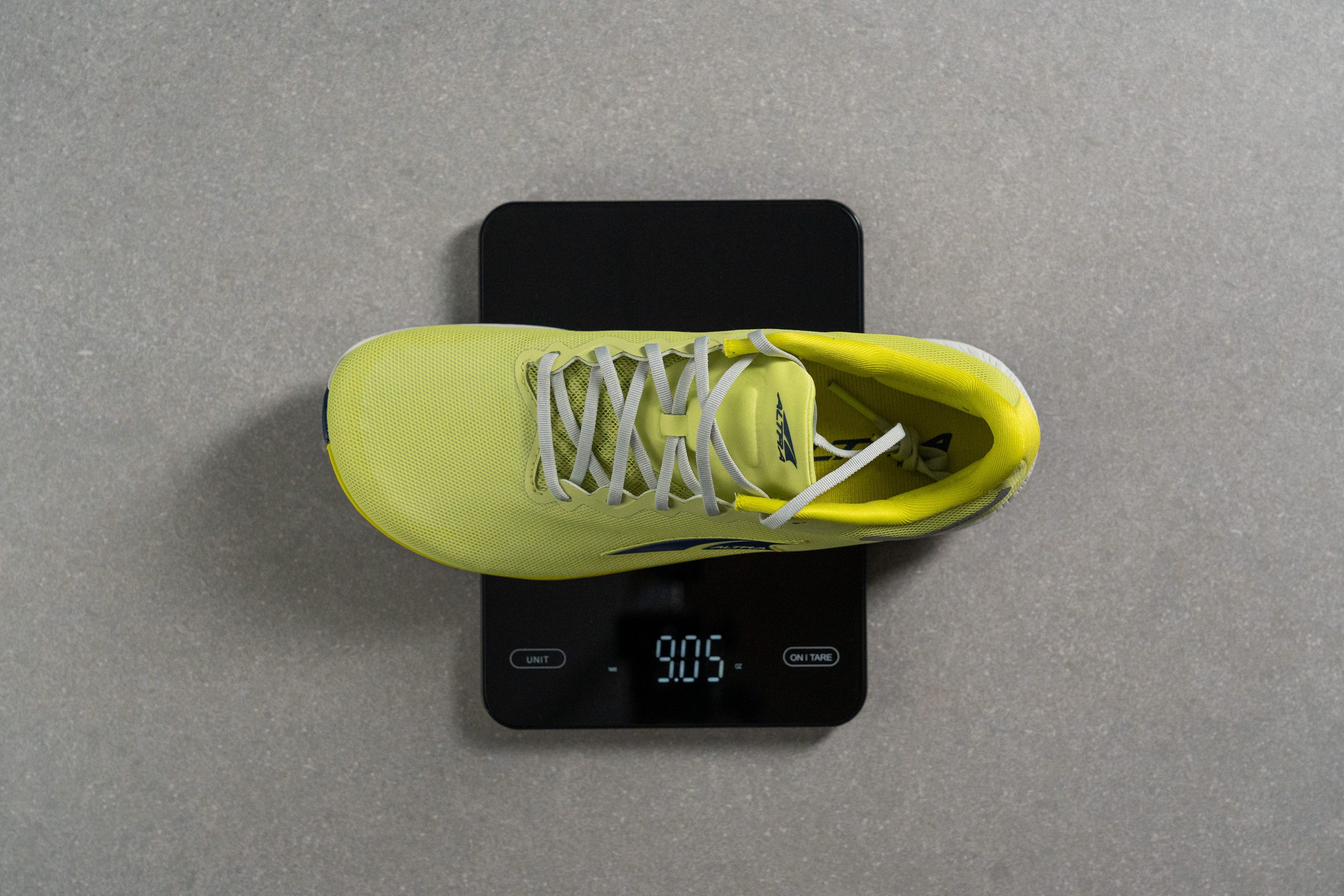
| Rivera 3 | 9.1 oz (257g) |
| Average | 9.3 oz (264g) |
Breathability
Upon first glance, the Rivera 3's mesh upper seems porous enough to breeze through our breathability tests. However, putting the shoe through our smoke test quickly dispels us of this notion. As we can clearly see from the footage, the smoke is only able to escape the shoe through the tongue, thus earning the Rivera 3 a middle-of-the-road 3 out of 5 for breathability. It's no toaster, but it will definitely feel a little stuffy during muggy summer runs. For a more breathable alternative, we recommend checking out the Altra Torin 7 which boasts a similarly plush ride.
Even more surprising is when we inspected a backlit cross-section of the Rivera 3's upper. The light shines through the upper with ease which is usually an indicator of excellent breathability.
Looking at the upper mesh under our microscope gives us a better understanding of the shoe's
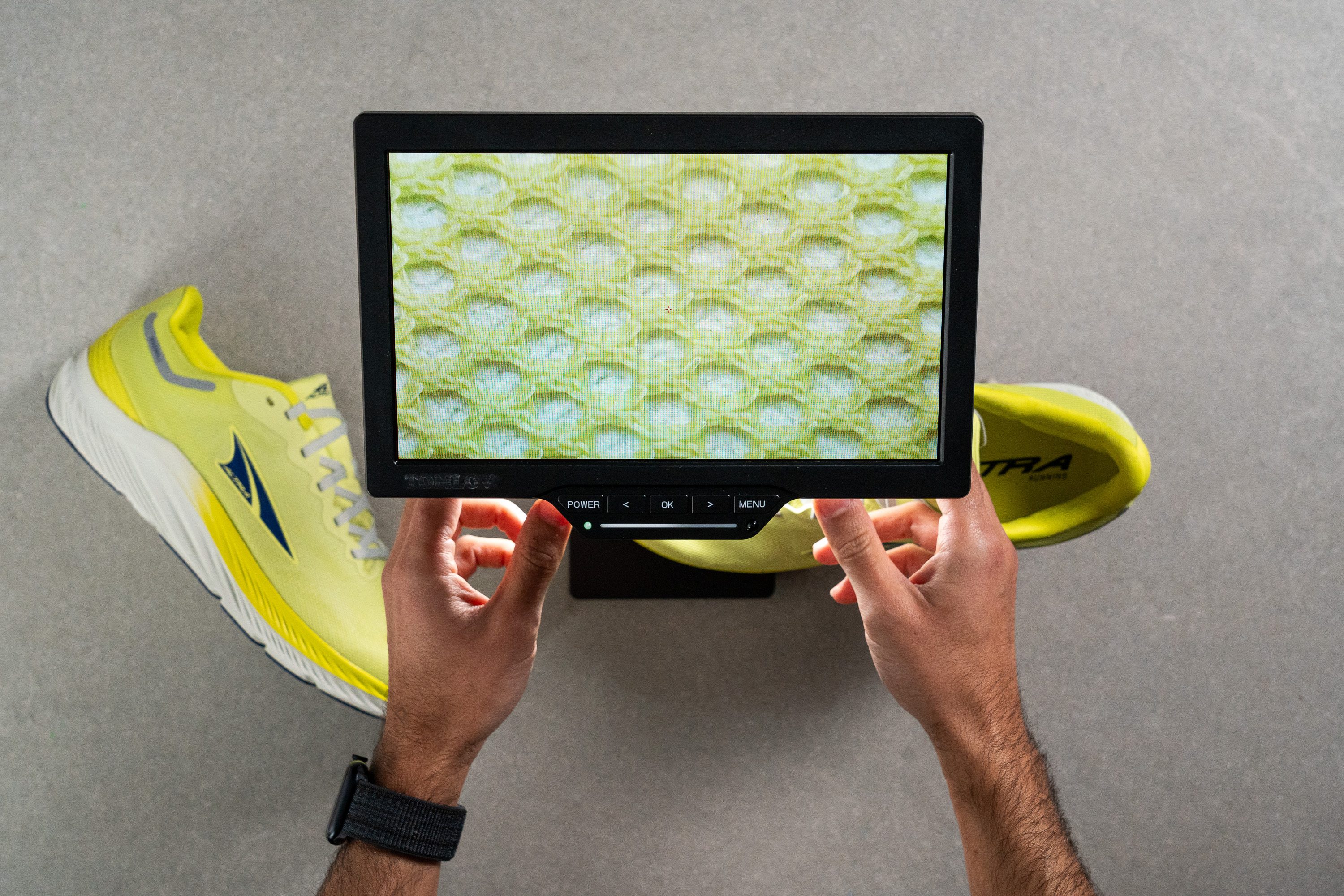
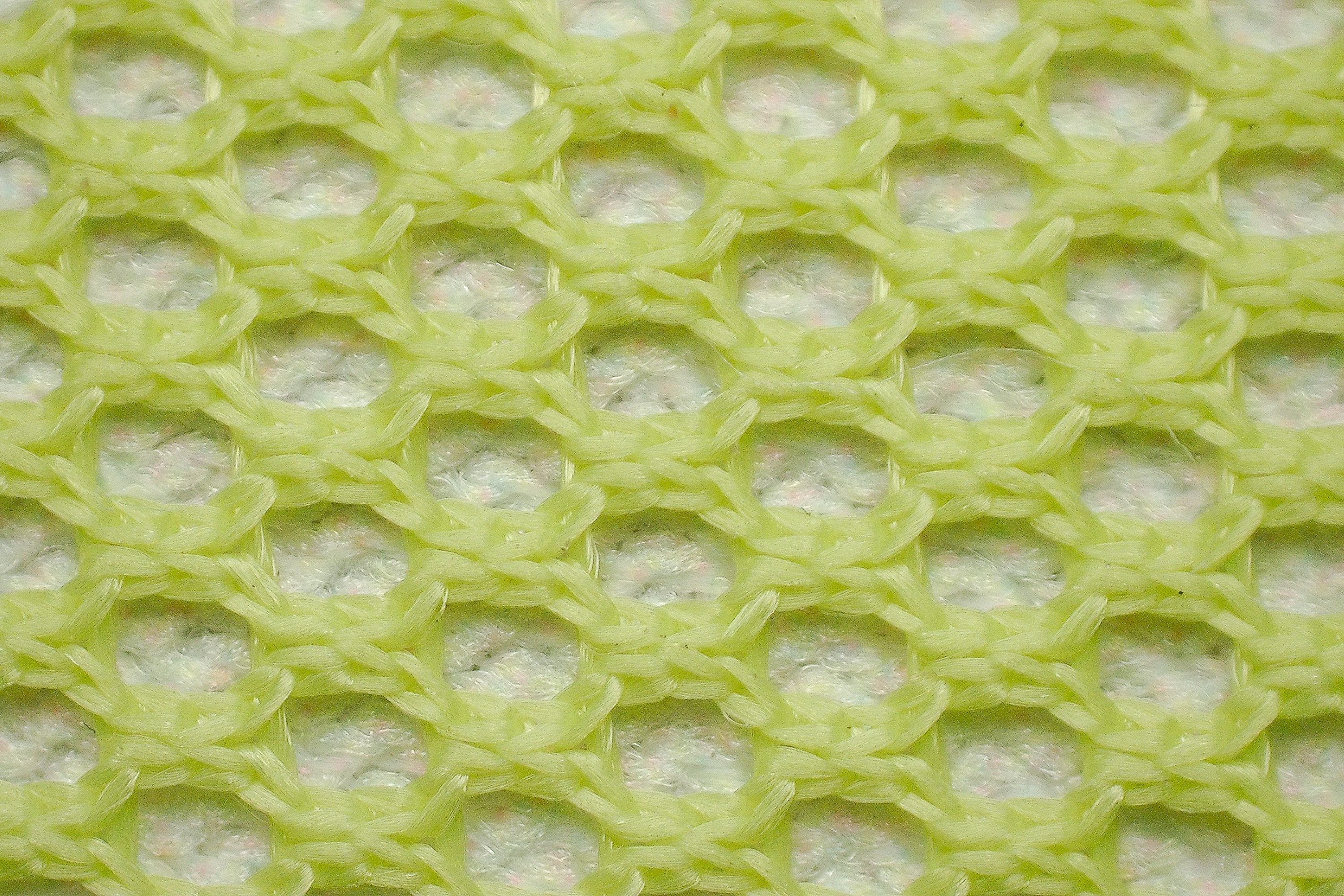
| Rivera 3 | 3 |
| Average | 3.7 |
Stability
Lateral stability test
Despite the shoe's relatively narrow base, the Rivera 3 feels pretty well-planted and stable on the ground. This is likely a result of the shoe's very slight offset which keeps our feet parallel to the ground as opposed to having an elevated heel which can feel unsteady, especially with such a cushy midsole.
That said, we recommend that runners with pronounced overpronation in their stride should consider a trainer with added stability features that mitigate any excessive lateral movements like the Altra Provision 6.
Torsional rigidity
The Rivera 3 put up a mild level of resistance as we bent and twisted it in our hands, leading us to give it a middle-of-the-road torsional rigidity score of 3 out of 5 based on our subjective scale. As such, the shoe does allow for some natural lateral movements in our stride while still maintaining a somewhat level surface for stable landings and toe offs.
This is thanks in part to the outsole's FootPod technology which utilizes grooves that align with the bones of our foot and contribute to the shoe's natural underfoot sensation.
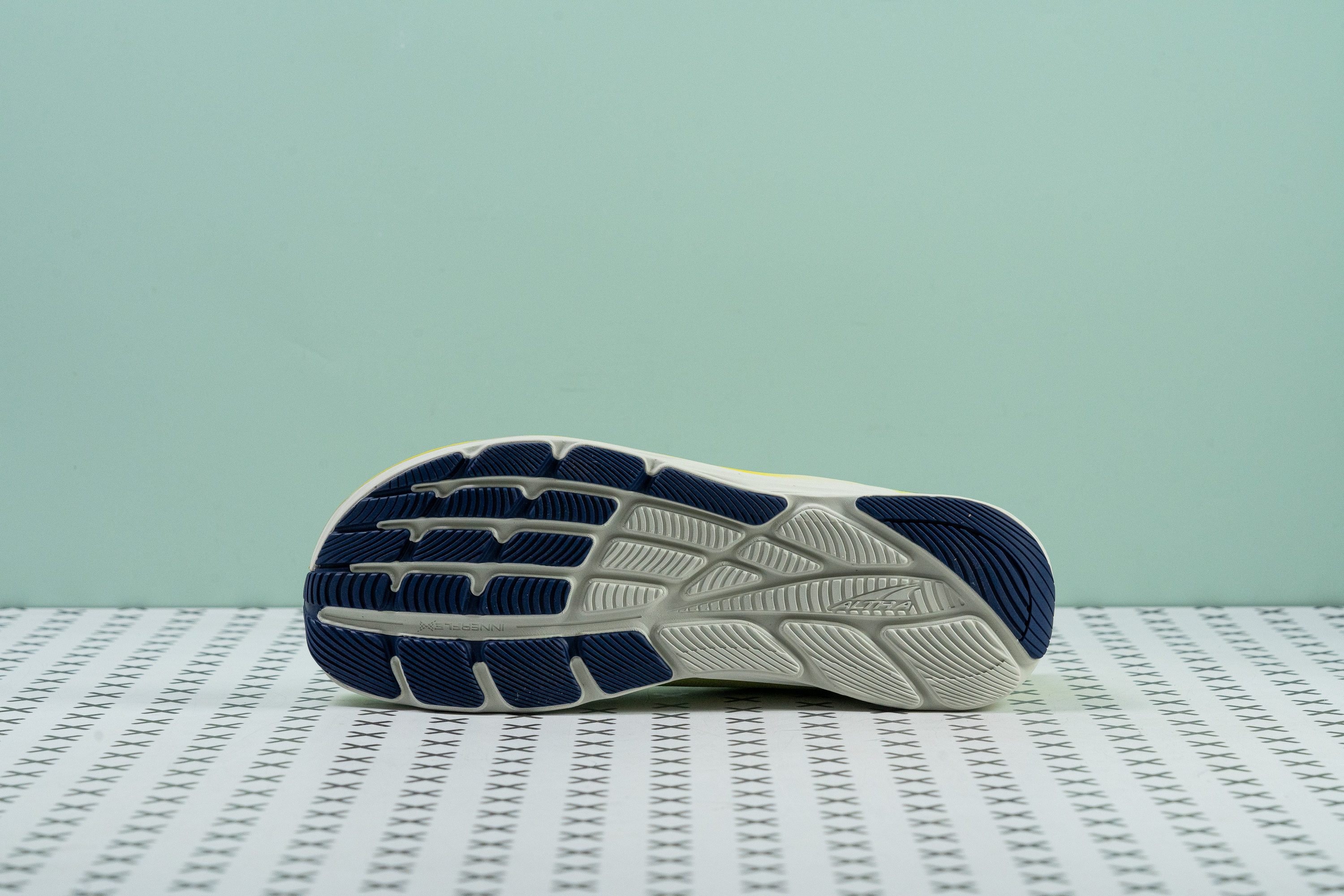
| Rivera 3 | 3 |
| Average | 3.5 |
Heel counter stiffness
The Rivera 3's heel counter is also moderately stiff, scoring another 3 out of 5 in our manual assessment.
It's also luxuriously padded and quite roomy, making the Rivera 3 an incredibly welcoming shoe to put on. These factors also mean that the shoe's rearfoot lockdown leaves a little to be desired as we did experience some heel rubs during our test runs.
However, with the softness of the lining material and the pillowy padding, this isn't uncomfortable but does make the Rivera 3 a less-than-ideal choice for speedy tempo sessions. We recommend the Altra Escalante 3 as a speedier alternative with a more locked-in feeling.
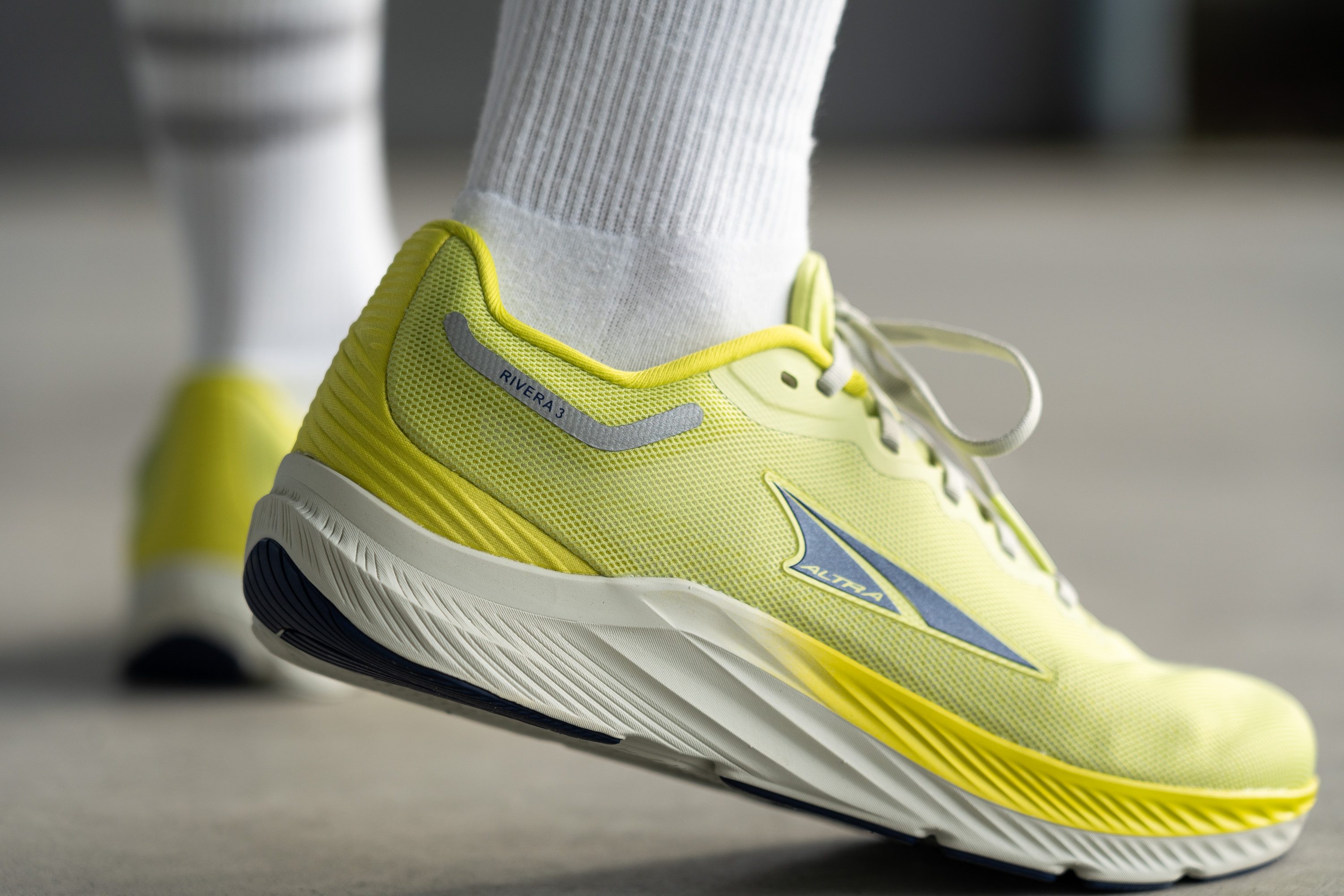
| Rivera 3 | 3 |
| Average | 2.9 |
Midsole width - forefoot
The Rivera 3's midsole is narrower than average at only 104.6 mm wide at the forefoot according to our caliper measurements.
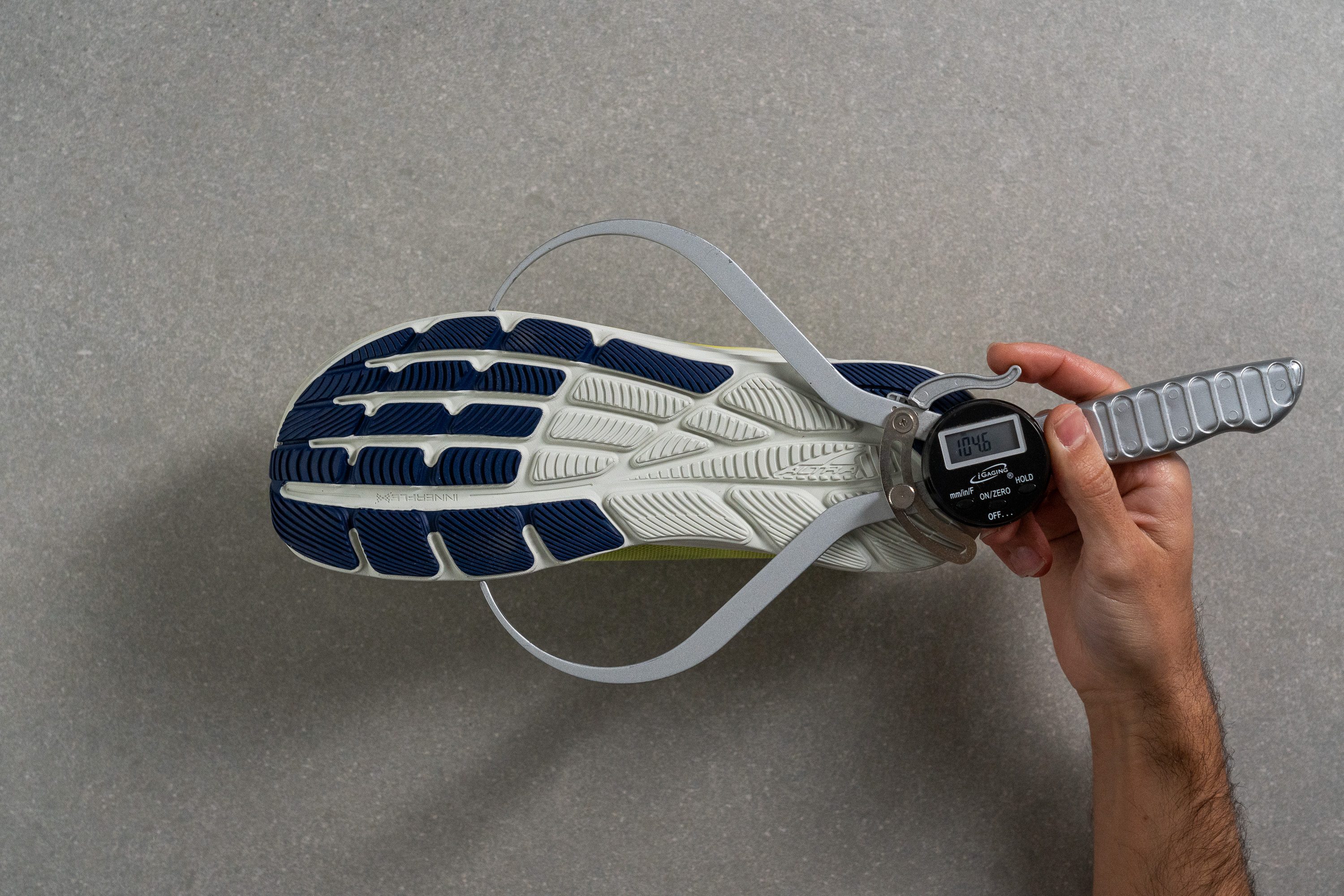
This still felt pretty stable as we tested the shoe, with this sleek silhouette allowing us to take on corners with speed and agility.
| Rivera 3 | 104.6 mm |
| Average | 114.4 mm |
Midsole width - heel
Back at the heel, the Rivera 3's midsole is only 83 mm wide which is also narrower than our current lab average.
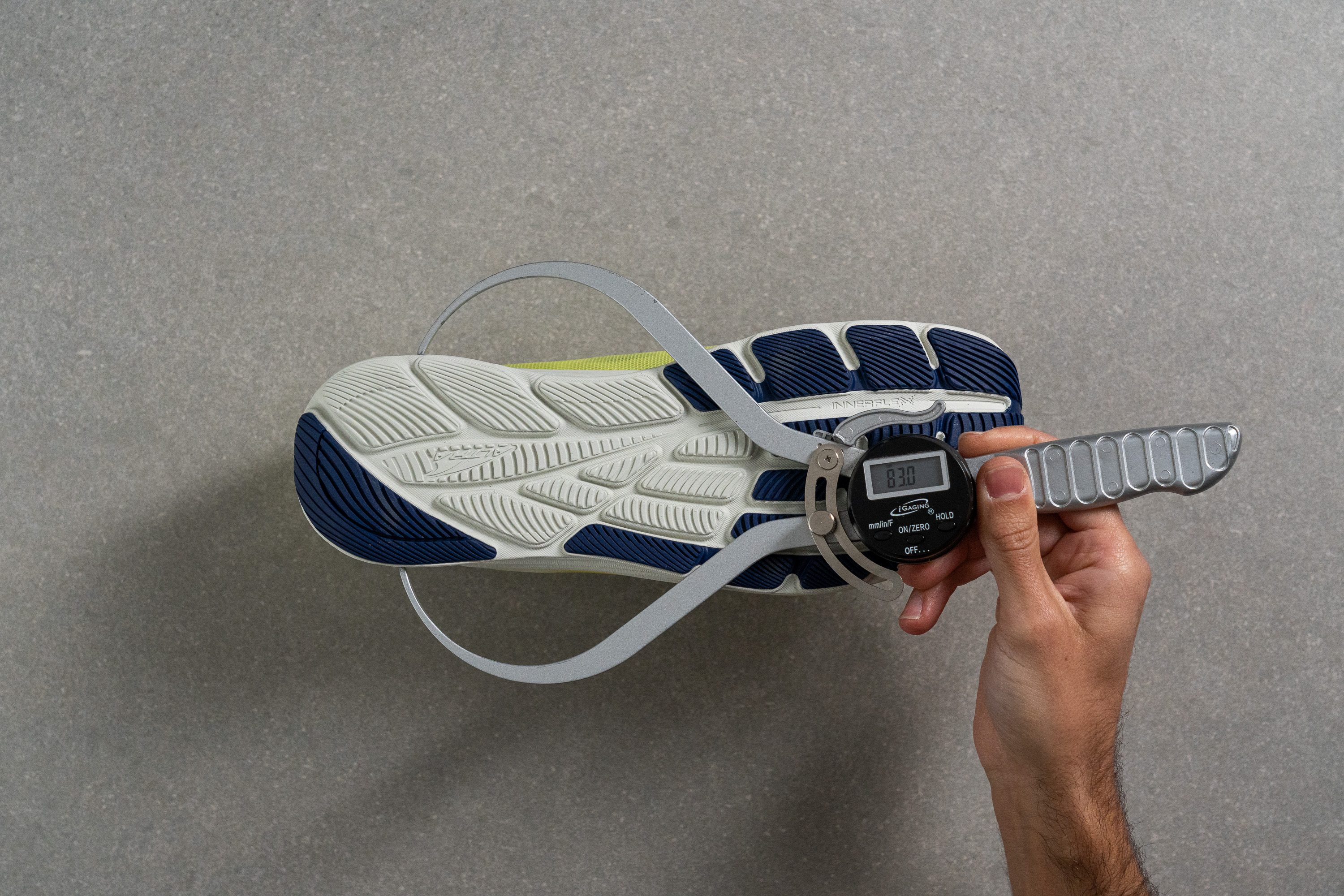
Heel-striking runners more accustomed to a wider landing platform should consider the Altra VIA Olympus as a more suitable zero-drop trainer.
| Rivera 3 | 83.0 mm |
| Average | 90.6 mm |
Durability
Toebox durability
Having a double-layered mesh didn't give the Rivera 3 a leg up when facing our Dremel in the first of our durability tests. Spinning at 5K RPM and setting and applied with 3.2N of force, our tool made quick work of the toebox and sent shreds of material flying from the moment of contact until the four-second test was over, leaving a gaping hole in its wake. We therefore give the Rivera 3 a toebox durability score of 1 out of 5.
It should go without saying that we don't recommend getting adventurous and taking this shoe off-road as one unlucky snag could spell the end of an otherwise excellent shoe.
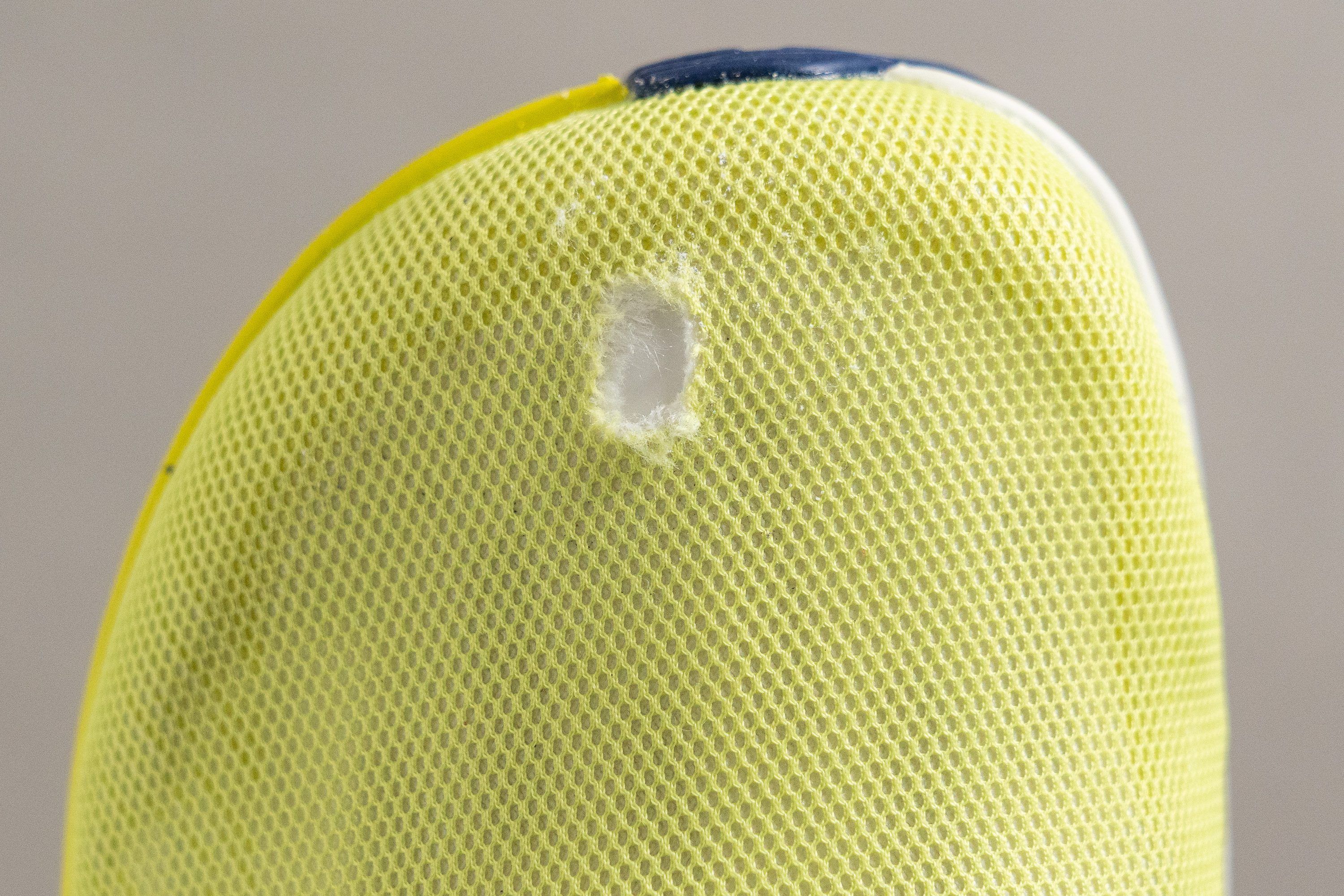
| Rivera 3 | 1 |
| Average | 2.6 |
Heel padding durability
The heel counter, on the other hand, proved to be a much more worthy adversary against our Dremel. The tool's grinding element wasn't able to bite into the Rivera 3's sturdy lining which was left relatively unscathed by the end of the four-second test.
This stellar performance earns the Rivera 3 a perfect 5 out of 5 for heel padding durability which means that we have no concerns going for sockless runs in this shoe.
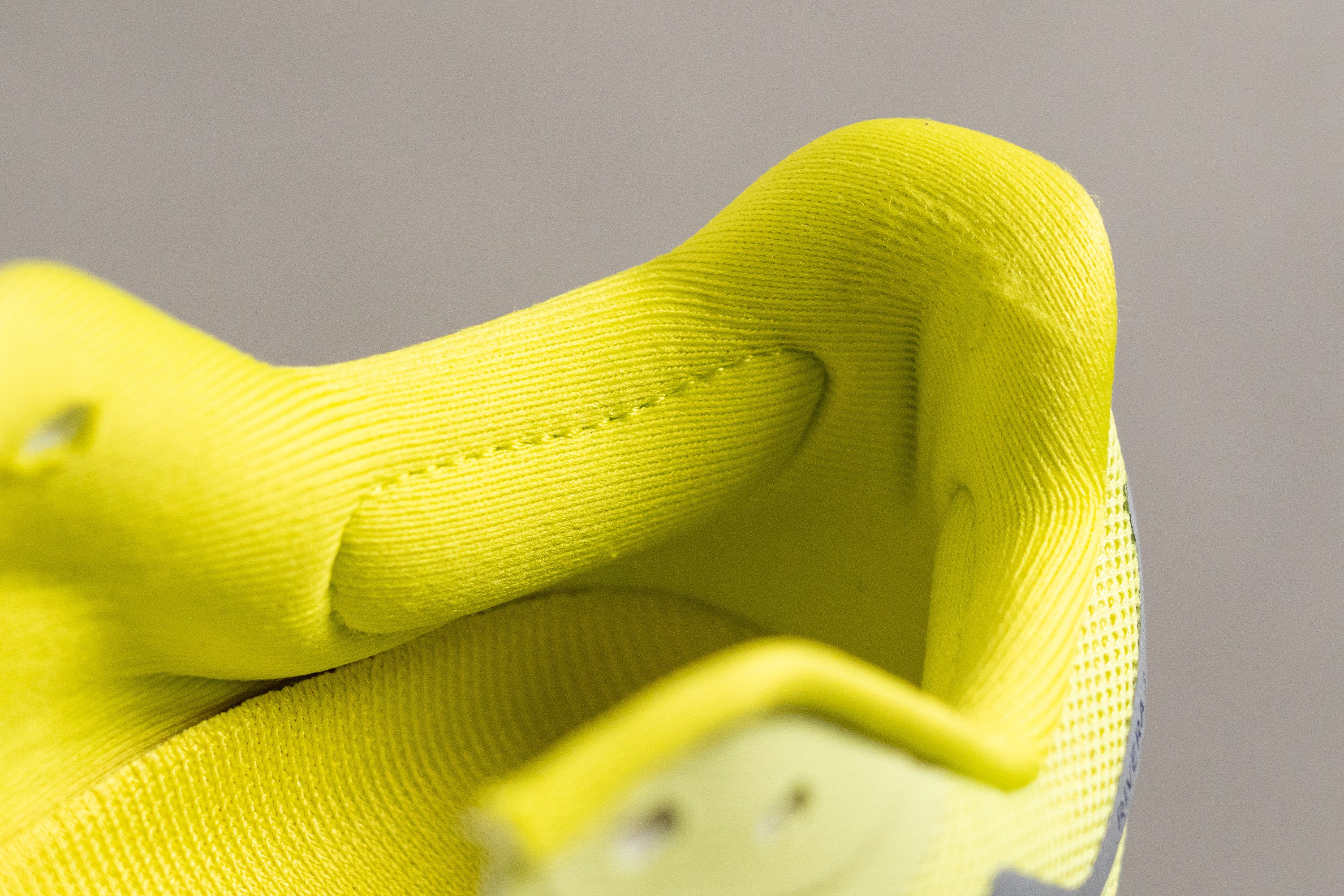
| Rivera 3 | 5 |
| Average | 3.4 |
Outsole hardness
Pressing our durometer against the Rivera 3's outsole yields an average reading of 79.9 HC. This usually indicates a healthy balance of soft and grippy versus hard and durable.
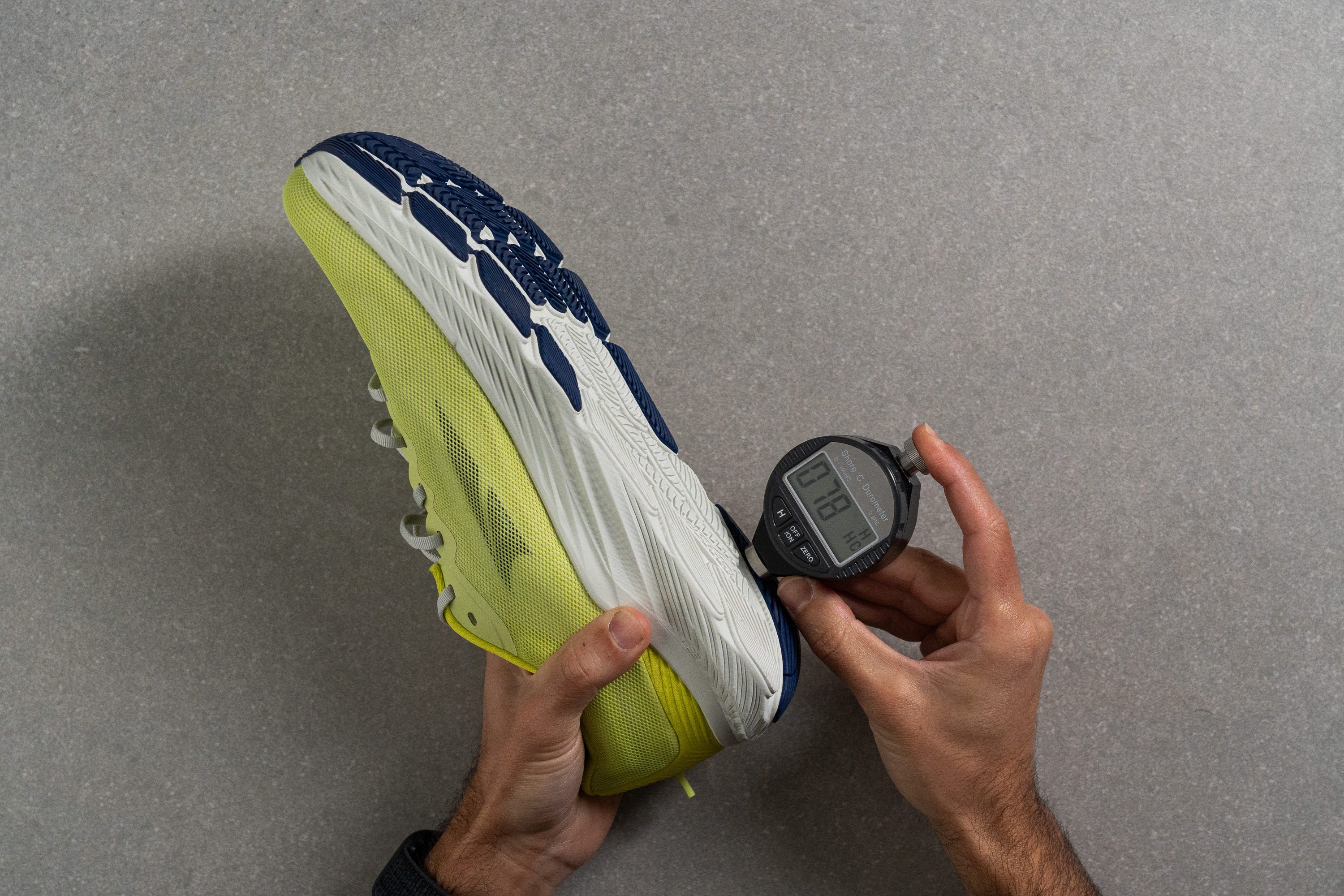
| Rivera 3 | 79.9 HC |
| Average | 79.2 HC |
Outsole durability
This time spinning at 10K RPM, we set our Dremel against the Rivera 3's outsole for twenty-two seconds of grinding.
Using a tire tread gauge to measure the indentation left in the aftermath of the test, we found that we had only lopped off 0.5 mm of rubber from the Rivera 3's outsole. This better-than-average performance means that we don't expect to see any major signs of wear and tear on the outsole until well beyond 400-miles of use.
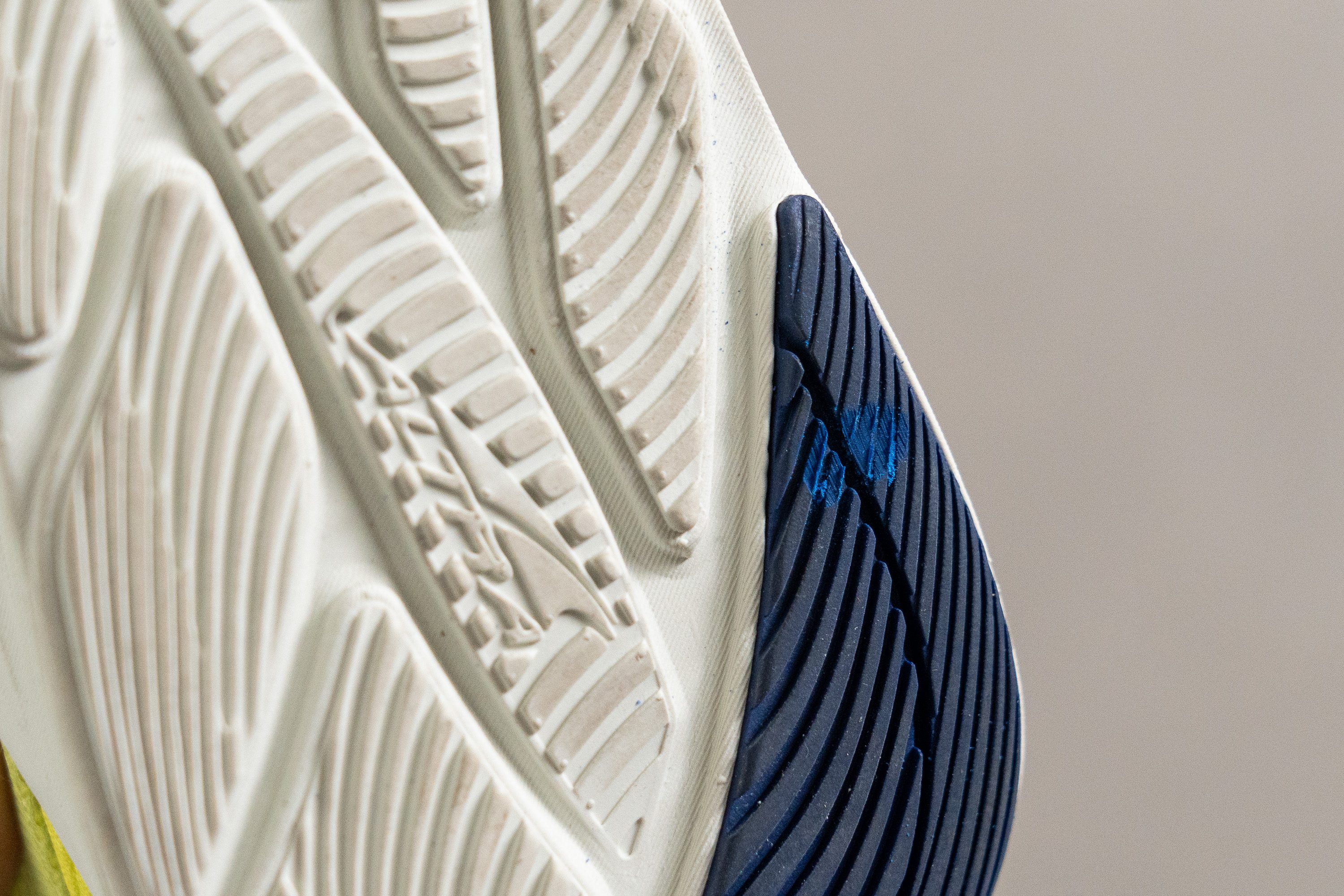
| Rivera 3 | 0.5 mm |
| Average | 1.1 mm |
Outsole thickness
The Rivera 3's outsole is 3.2 mm thick based on our caliper measurements which is on par with our current lab average. This gives us a good amount of grippy rubber underfoot without adding too much weight onto the shoe.
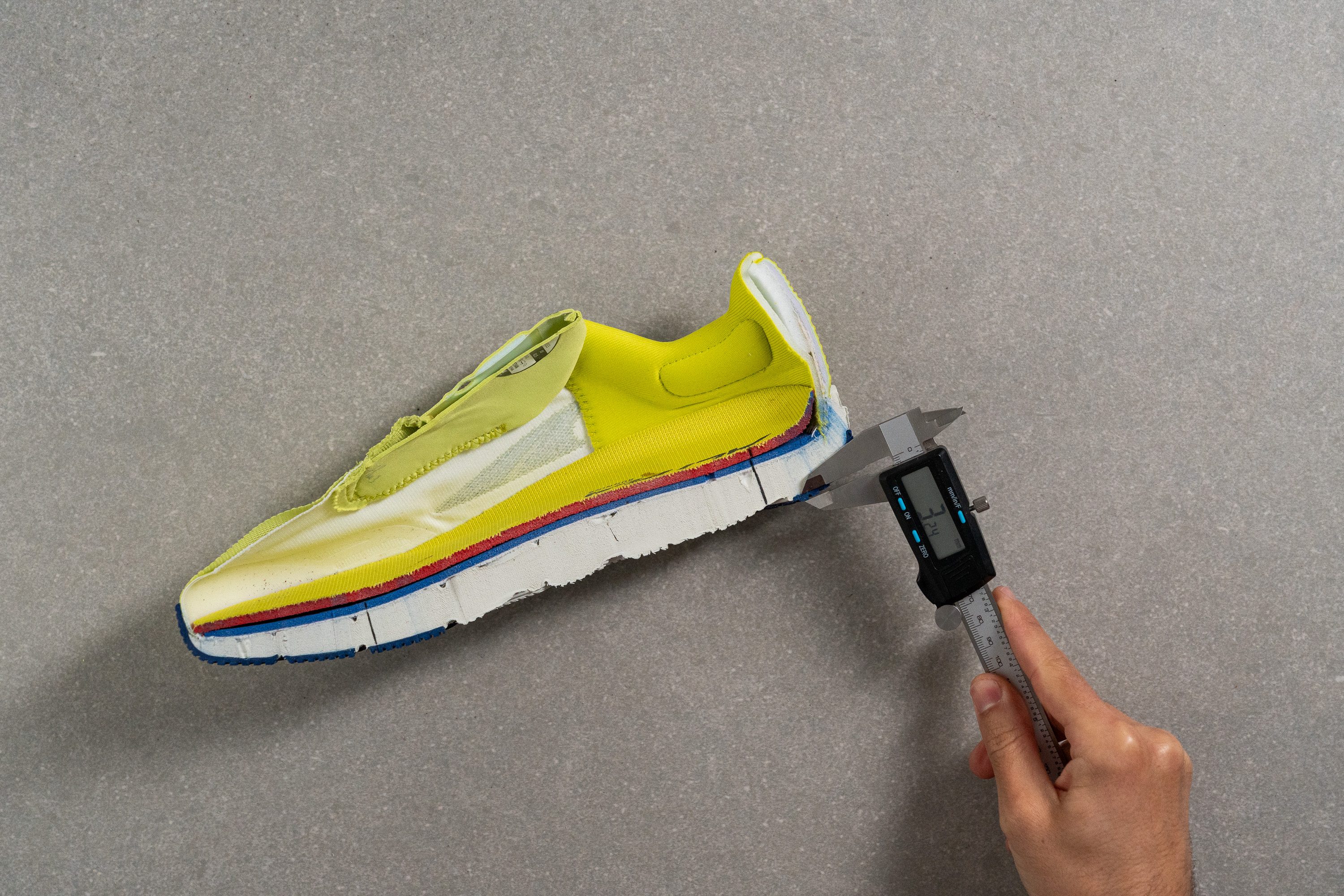
| Rivera 3 | 3.2 mm |
| Average | 3.2 mm |
Misc
Insole thickness
The Rivera 3's insole is 4.7 mm thick according to our caliper measurements, putting it right around our current lab average. This provides adequate arch support and a soft internal platform that nicely complements the midsole cushioning.
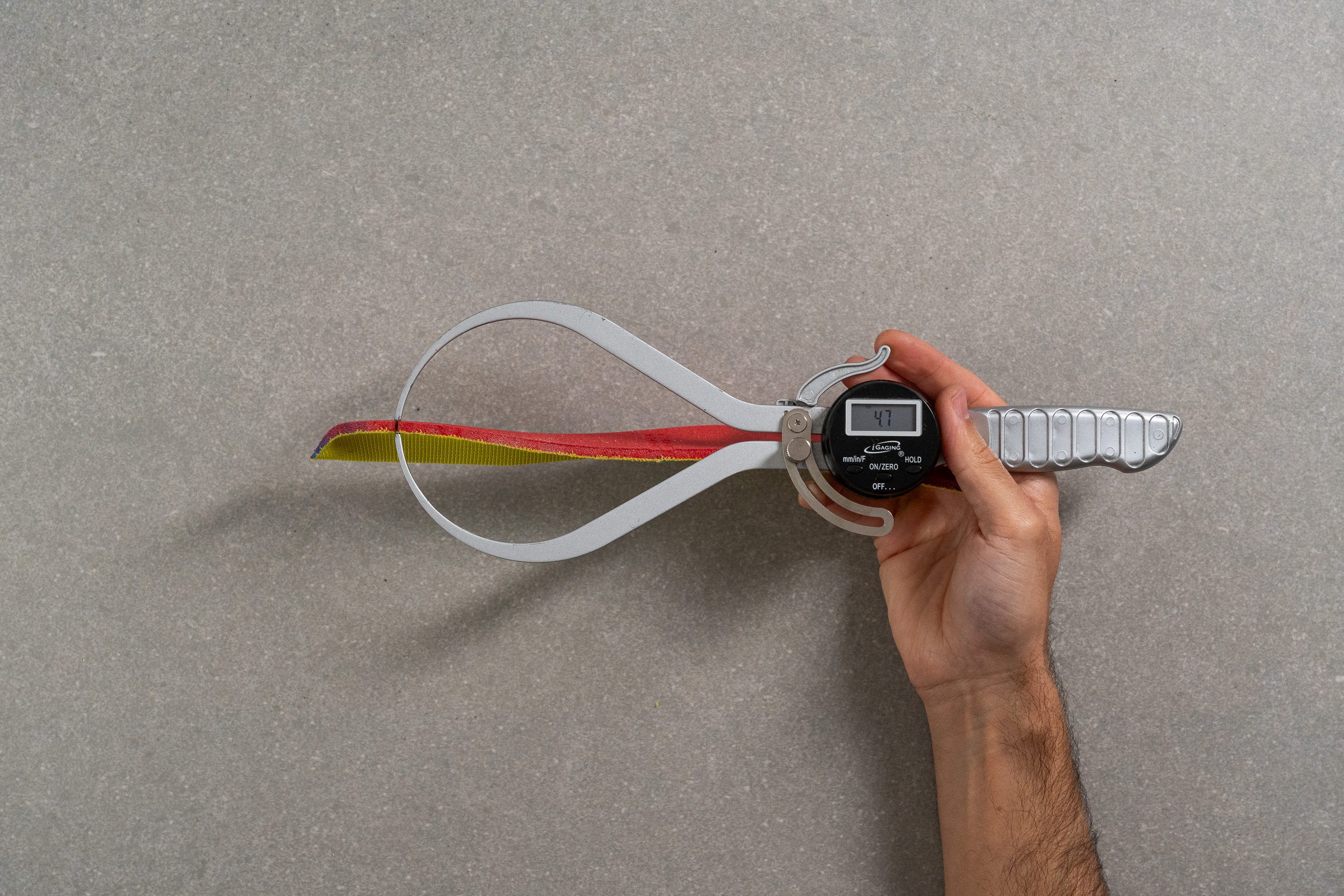
| Rivera 3 | 4.7 mm |
| Average | 4.5 mm |
Removable insole
The Rivera 3's insole is removable, so runner's in need of additional arch support in the form of custom orthotics can use them with this shoe.
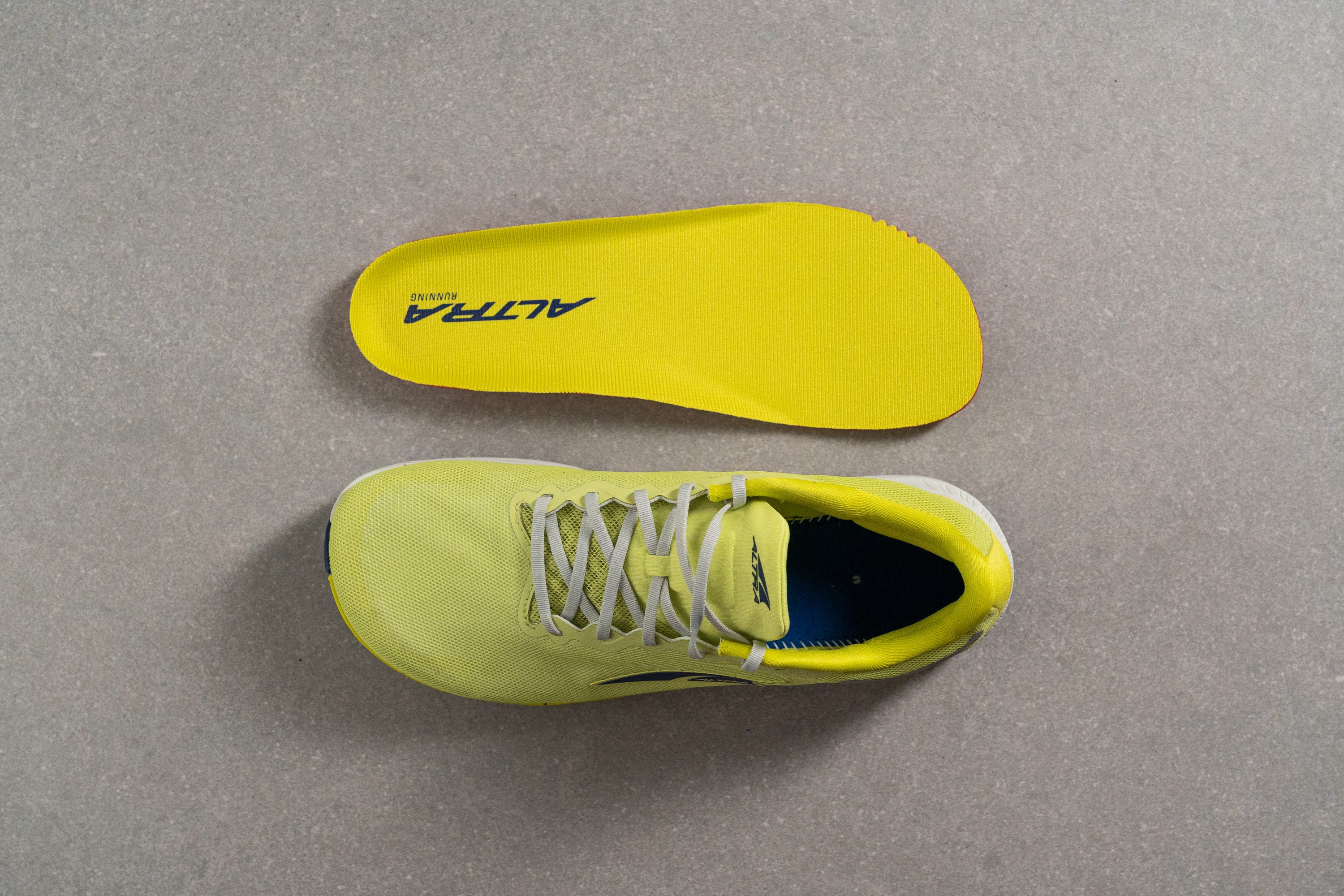
| Rivera 3 | Yes |
Midsole softness in cold (%)
To test the effects of cold conditions on the midsole, we placed the Rivera 3 in our freezer for twenty minutes. Once appropriately chilled, we got a durometer reading of 20.5 HA.
This is still quite a plush reading that's softer than the average shoe even at room temperature! As such, the Rivera 3 will make a good training partner for those living in colder climates and want a shoe that's cushy underfoot all year round.
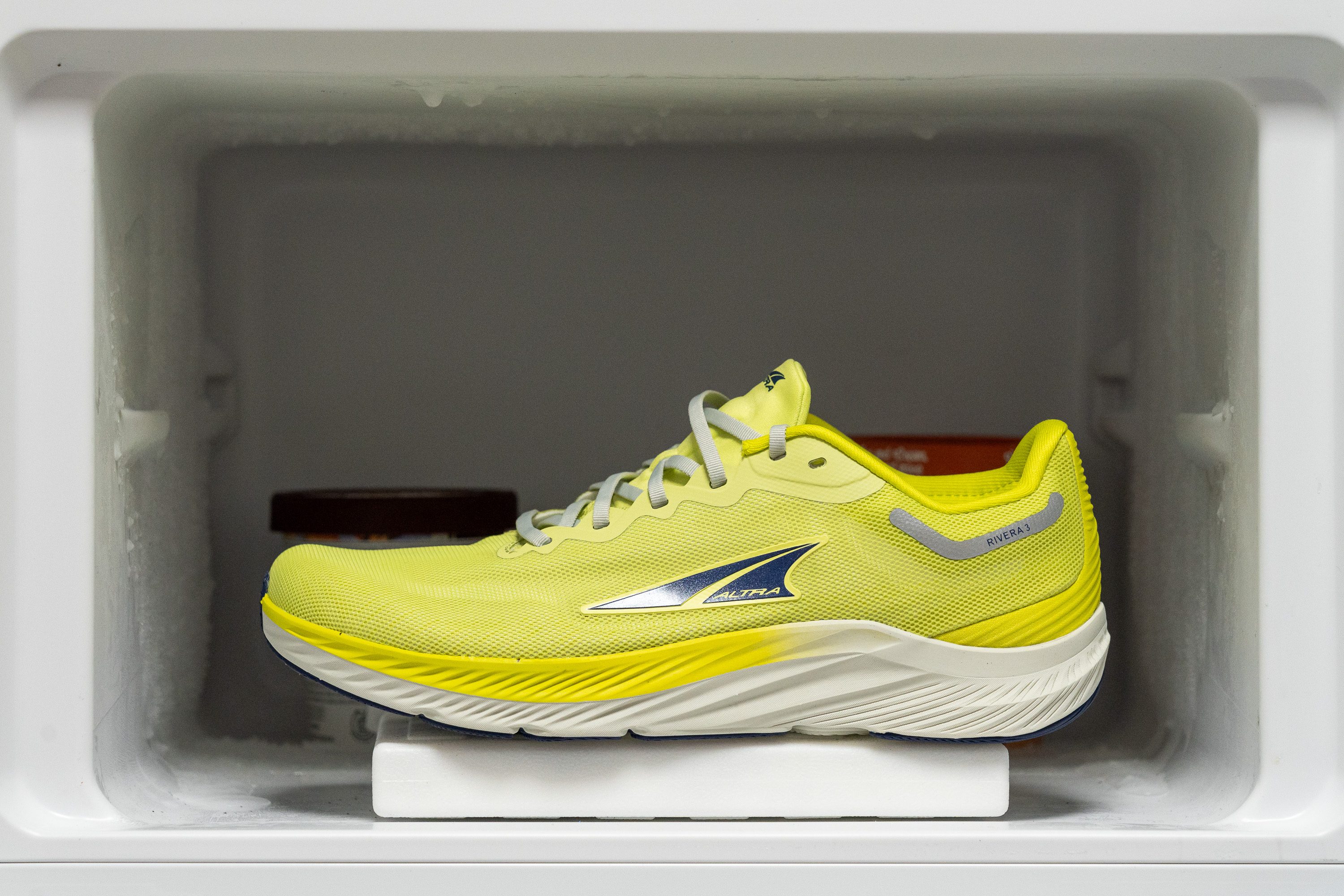
| Rivera 3 | 33% |
| Average | 24% |
Reflective elements
The Rivera 3 boasts a reflective streak under the anke that proudly bears the model name and provides some minimal level of nighttime visibility.
| Rivera 3 | Yes |
Tongue padding
The Rivera 3's tongue is slightly less padded than average at 4.9 mm thick according to our caliper measurements. This still provided us with enough comfort around the instep during our test runs and did a good job protecting us from lace bite.
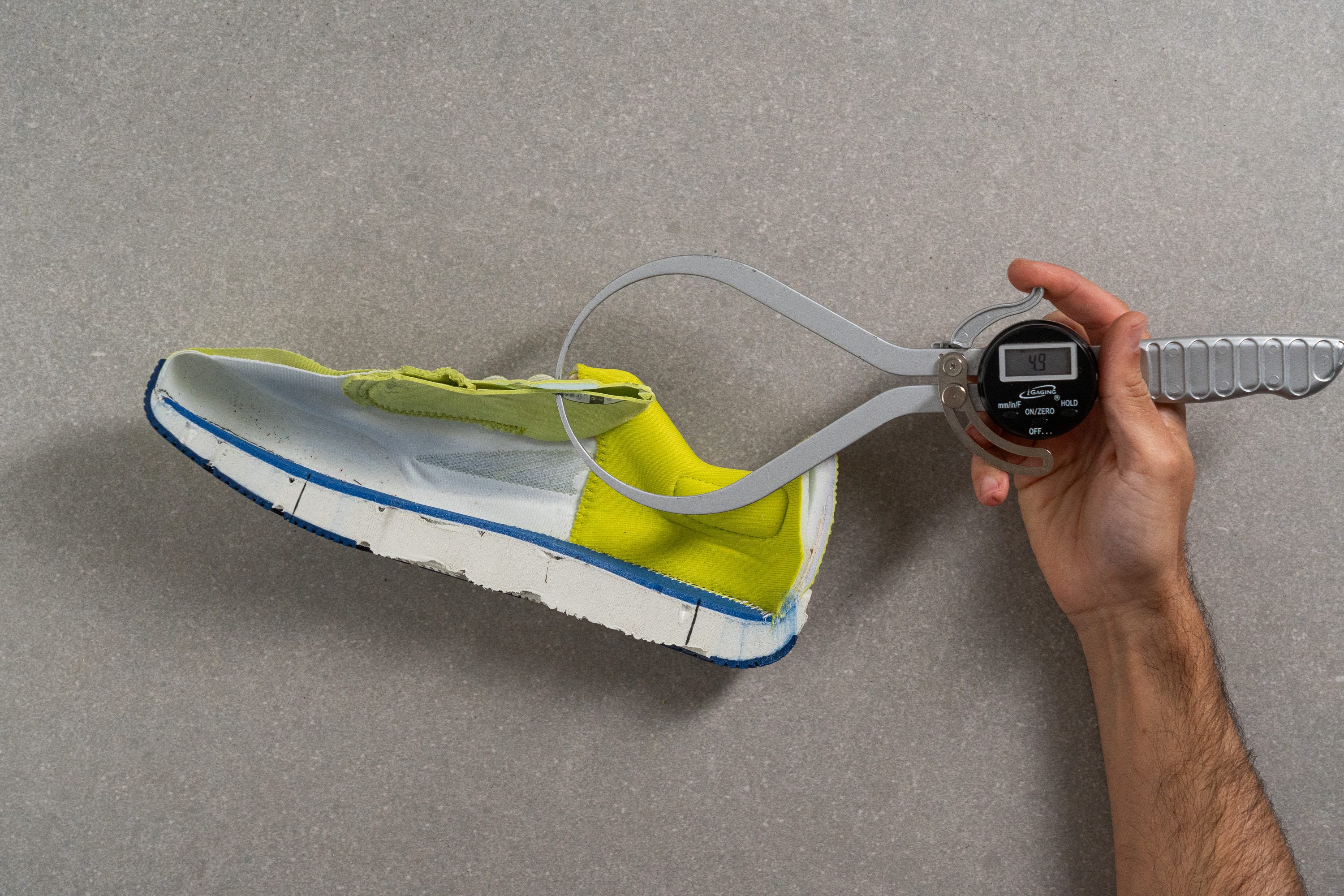
| Rivera 3 | 4.9 mm |
| Average | 5.7 mm |
Tongue: gusset type
The Rivera 3's tongue isn't gusseted, though the lace loop in the middle of the tongue does a good job of mitigating any slippage as we ran in the shoe.
| Rivera 3 | None |
Heel tab
No pull tabs or finger loops to be found on this Altra shoe.
| Rivera 3 | None |
Laces
One of the more annoying nitpicks we had while testing the Rivera 3 was the laces. Usually, textured flat laces have enough friction to stay tied up but the Rivera 3's are so smooth that they frequently came undone during our test runs.
